#this is more a train of thought than a proper theory or analysis
Text
I don't have a perfect grasp on Jubei as a character yet (haven't even started a proper character study of him) but I was thinking about him the other day, and his role as a father. People like to talk/debate/joke about him being a good or bad parent, and I get that's its own conversation, but it got me thinking.
I ended up, uh, rambling here, so TLDR;
I think Jubei's decision to start taking in kids like Ragna, Luna and Sena was inspired by a lot of complicated feelings, including
Every time he leaves, thinking the kids will be safe, things go to shit- he's guilty for that and doesn't want to make the same mistake again. (Kokonoe clearly hated her childhood, he left the kids with Celica and then the Church Incident happened)
Ragna looks so much like 'Bloodedge,' there may have been a sense of closeness/familiarity there, and a desire to not leave his friend behind a second time- especially to face certain death again (Bloodedge v. Black Beast, kid Ragna v. Terumi)
Ragna's desire to hunt down and kill Terumi could also bring back memories of Tomonori, who Jubei let chase Terumi despite knowing he couldn't win- and surprise, surprise, Tomonori died. Could Jubei let another person make the same mistake??? Let a fucking kid do it?
Jubei never really agrees to be a father or a parent to these kids, and doesn't see himself as one. He agrees to be their teacher until they're strong enough to take care of themselves, because they have no one else.
Wow even my TLDRs are too fuckin' long
As for the theory/rant in its entirety, which may just repeat the same points in more words;
I'd argue that Jubei hasn't wanted to be a father since Kokonoe. I haven't been able to read the parts of Phase Shift where he and Nine are together, so I don't know how he felt about having a child on the way. But as I understand it, he didn't leave her until he was being framed as a terrorist, being hunted down, at risk of being executed/assassinated.
He left Kokonoe behind in hopes she would be safer without him. Ultimately that may not have been the best choice, but it was a reasonable choice for a man who would have to spend the rest of his life on the run. And since then, I don't think he's ever seen himself as a father.
He got involved in Ragna's life first when he rescued the sibling trio from the lab where they were being held. We don't know a hell of a lot about that story either, but it seems like he had zero intention of raising any of them. He brings them to Celica, where he thinks they'll be safe and he can fully trust that they'll be loved. He views Celica as capable of being a parent, but he knows he himself isn't. He's a wanderer, a warrior, he can't provide the kids the life they deserve. So, again, he leaves them behind, where he thinks they can have a better life.
But he's wrong. He's so, so wrong. After the attack on the church, Jubei's only remaining family is dead, and everything Ragna had is also gone, assumed dead. Jubei walked away once and hurt his daughter, he walked away twice and lives were lost.
I think his choice to take Ragna in, after that, was a complicated one. I don't think Jubei ever saw it as adoption. I'd argue that Jubei and Ragna are undoubtedly a family, but I don't think Jubei would call it that openly, and I definitely don't think he was looking at it like that at the start.
I think, for Jubei, it was the only choice left after his neglect had caused so much pain.
And I think, knowing Terumi was at the heart of it again, seeing Ragna's hatred and desire for revenge, I think maybe Jubei thought of Tomonori. The brother he lost because he let him chase Terumi alone. Maybe that circled back, as another person his inaction/abandonment had left to die. How could he walk away again? Let another person charge unprepared into a fight against Terumi? Let a kid do it?
And I find it pretty hard to believe that, looking at young Ragna, Jubei didn't see his old friend. Bloodedge. Someone who changed his life, someone he held onto the memory of years after the short time they knew each other. Someone who also 'died' (as far as Jubei knows) because Jubei left him behind- even if he was asked to, even if they agreed upon it, even if it was for the best.
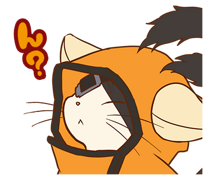
And even then, Jubei never considers himself a father. He doesn't let or encourage Ragna to call him 'dad', even though it's clear he loves him like a son. He doesn't see himself as a father. He agreed to be a (combat) teacher. That's what Ragna wanted and (in Jubei's eyes) needed at the time. It's what Luna and Sena would later need of him. Jubei has been a warrior all his life- he can be a teacher. But I don't think he thinks he could be a father, and I don't think he would ever agree to be one if asked. Not since he lost Kokonoe.
#blazblue#jubei#tomonori#six heroes#ragna the bloodedge#kokonoe mercury#bb meta#jin kisaragi#platinum the trinity#saya#yuuki terumi#celica a mercury#ao no imakagami#I wrote this whole mess in one go so don't hold your breath#and like I said I haven't really studied Jubei's character#maybe my opinion will change once I really take a look at him#this is more a train of thought than a proper theory or analysis#but I think it's an interpretation of his character I don't see talked about a lot#and I think it might have merit#I also think this is the most thought-heavy thing I've written since my last concussion which is cool#glad I can still do that
29 notes
·
View notes
Text
Life Series SMP/Eyes and Ears AU Thematic Discussion + Theorycrafting (pt. 1)
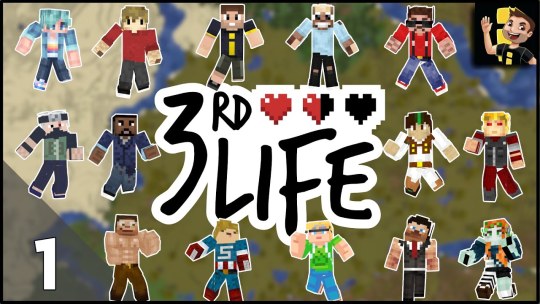
WARNING: Extremely long post
Kachow what’s poppin fellas, I’m back at it again talking about boomer block Youtubers and their surprisingly in-depth improv series. Now that the Life Series’ 5th season has finally concluded, I’m back on the lore train and poor Scar is left to suffer the consequences, and Martyn’s concluded yet another lore stream, I decided to compile a long master post of lore notes and theories about what we have so far.
Obviously all the ‘lore’ of the Life Series is purely unofficial; Grian has not approved any of it as being actually official/set in stone for what he intended the series to be. Most of it has been us in the crazy fandom extrapolating their really good storytelling, and also “semi-canonized” by Martyn in what he calls the Eyes and Ears AU (and this post assumes you are familiar with it). As someone who’s been a fan since the beginning way back in 3rd Life, I’ve pretty much hopped on the lore train since the beginning as well (if casually) and enjoying all the different extrapolations/analysis/angst written around the players. Rather than just theorizing lore details in a vacuum, however, I’ve always liked imagining the lore based around the reoccurring themes, symbolism and arcs we’ve seen across the series. I’d been bouncing my various thoughts and theories around these themes for a while, and finally I decided to compile my notes together.
This post is basically my imagining what the Life Series/Eyes and Ears AU story is “about,” as if it were a fleshed-out, long-running and story-driven tv show. Initially this post started as simply a gigantic “Eyes and Ears Theory,” me trying to sus out my own theories/ideas of what the Life Series’ mysteries were based on Martyn’s lore. However, considering that Martyn is ALSO writing the lore on the fly, and I have some details I would interpret differently or change, this ended up less a ‘theory’ and more ‘me writing an entire AU/interpretation of the Life Series as a whole.’ My intention is NOT to ‘correct’ Martyn’s lore, nor to claim my theory as the ‘right’ interpretation; rather, this is my personal interpretation of what the Life Series story is about, based on information shown in the original SMP and in Martyn’s AU.
One last disclaimer: I am ONLY drawing on lore details from the Life Series, Martyn’s lore streams, and Minecraft EVO, and also references to the iRL creators. I am not drawing on any story from other SMPs such as Pirates or Empires; there may be some Hermitcraft references here and there.
This is going to be very long, and a multi-parter, because I can’t summarize to save my life. And I promise I’ll come up with a proper name for my series of posts another time. If you’ve stuck around to read, I thank you.
Part 1: The Overall Plot + Understanding the Watchers
Recap of official lore details
Although Martyn hasn’t given specific details on the Watcher + Listener species (he hasn’t come up with a name yet), we know the following details for sure (from EVO, lore streams etc.)
Watchers + Listeners + The Council are all deity-like beings of the same species, and they all consume human emotions
The Council are the upper ranks/possibly leaders, whereas the Watchers + Listeners are separate factions
The Watchers are at LEAST two high-ranking members of the species (the two dots being outcast from the wider circle, as is their logo)
The Watchers were behind Minecraft EVO, where they gave all the players tasks (much like Secret Life) and eventually ending in them fighting the Ender Dragon separately
While the Watchers may not have been evil in EVO, they certainly became so AFTER, when they began to crave more negative human emotions, viewing them as “tasty” (Martyn’s words), s p i c y
They first kidnapped Grian at the end of EVO season 1, turning him into a Watcher to possibly have him join their ranks, but he’s gone rogue after realizing what their plans for the Life Series were, and plans to rescue his friends from them
The Life Series was the Watchers’ ploy to trap the players in an infinite death game where they betray and cause each other pain, all to harvest their negative emotions. Grian, in defiance to this, takes control as the ‘game master’ to make the whole thing…well, a game, so that his friends can enjoy, have fun and ease their anguish. In Martyn’s words, this is like “pouring ketchup all over the Watchers’ sundae.”
The Listeners (EVO season 2) are an opposing faction to the Watchers who disagree with their methods, although why is unknown. They’ve attempted to contact some players (e.g. Jimmy) before back in EVO in order to oppose the Watchers, but it’s not known how successful they were. They’ve also tried to swap in players in the Life Series before (e.g. subbing Lizzie and Gem for Pearl and Cleo in Lim. Life) in order to sneak them in and try to subvert the game. The Watchers kidnapping Gem for Secret Life is partially in retaliation to the Listeners. The Listeners may not be good and may have nefarious intentions also, it is as yet still unknown.
There’s potentially a third faction, the Speakers, but very little is known about them and Martyn doesn’t want to elaborate on them yet.
Okay, but what are the Watchers even after?
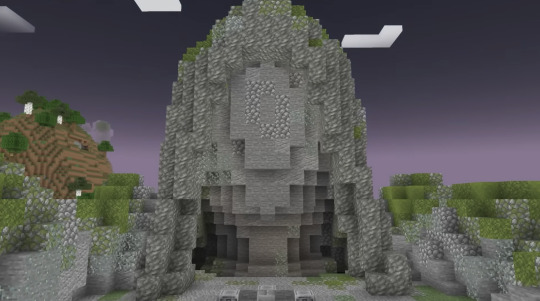
"Accept your fate."
From here on out is my real conjecturing/theorizing. The main question on my mind has been why are the Watchers doing what they’re doing? Obviously Martyn has confirmed that they are malicious deities who find negative human emotions tasty, but this raises further questions. Why exactly do they desire such emotions, or need them to survive (if they do, anyway)? Why do they favour negativity, when the other members of their species consume a wide range of emotions? They were confirmed to be outcast in some way from the other factions for this ploy, so what does that say about them then?
The whole species fundamentally do not understand human emotions (or perhaps do not even possess them)
This seems to me the most logical conclusion. These are powerful deities who can create miniature worlds/dimensions, life, and time to an extent (death loop). They should theoretically be self-sufficient, so I doubt that their consumption of human emotion is for survivability reasons (i.e. I don’t think Watchers will literally die if they don’t consume emotions, the same way humans die without food). What seems more likely is that human emotions bring them some benefit to their intelligence or power that they’d otherwise be quite non-functional without. (Think like the demons in The Promised Neverland, who regress to feral natures/lack of sapience if they don’t eat humans)
The Watchers’ powers and their lab-rat experimentation on the players gives a huge vibe of not being able to understand human emotions in an involved way, but only from a distance. They know methodically things like murder and betrayal cause panic and anguish, so they enforce these experiences through the game, mechanics like the Boogeyman, the Secret Tasks etc. But they don’t really know internally why these emotions come about the way humans do. Being above time, they probably don’t understand why the funny small animals have so much attachment to their transitory experiences and memories (more on this later).

world's angriest pumpkin
The Watchers are Losers, Actually
Going further, don’t you think the Watchers have a very misanthropic mindset all around? “Anguish and panic are s p i c y.” They conversely have a complete disgust for positive emotions, and can’t stand Grian making things fun for everybody. It almost feels like they have the mindset that only things like hatred and fear are exciting, bringing motivation and life to the humans, whereas things like happiness and fun are ‘useless’ because they don’t bring about the same results. Let’s also not forget their name – Watchers – and that Martyn’s confirmed them to be symbolically based off us, the audience. It’s almost like a commentary of the worst of the entertainment industry, of an audience who crave watching anything and everything to satisfy their own desires, even at the expense of the privacy and safety of the entertainer. Given the current state of the internet and social media, I don’t think I need to elaborate how awful things can get.
In other words, I believe the main motivation the Watchers are eating humans emotions is because they WANT to understand and ‘take into themselves’ such emotions. I don’t think they’re totally emotionless – Martyn does portray them with moments of glee and anger. But their understanding of emotions is superficial (self-centered, if you will) at best. As deities with no needs, being above time, they have nothing to be afraid of and nothing to feel sad or anguished over. It’s a boring, dull and empty existence. And that’s precisely why they’ve set up the Life Series game: by kidnapping a few humans and putting them through the artificially constructed wringer of panic and betrayal, they think they can create a human farm of such rich, complex and exciting emotions, all for themselves to enjoy at their own pleasure and fill the void they have.
(Listeners’ side note: If all that is the philosophy of the Watchers, it’s probably not difficult to see how/why the Listeners oppose them. The Listeners likely disagree that negative emotions are the most optimal state of humans, and unlike the Watchers do not think human suffering is just tasty popcorn one can eat at one’s pleasure. Their name – Listeners – implies they’re a more sympathetic faction, as in they listen to one’s troubles and heart rather than take delight in suffering at a superficial level. But if they are the same species, it’s very likely they have the same lack of instinctive understanding of human emotions that the Watchers do, and this could cause…problems.)
Why turn Grian?
All this is also why I believe the Watchers kidnapped Grian + turned him into a Watcher in the first place. Firstly, if they were going to concoct their plan to trap humans, they needed a collaborator from the humans in the first place. Secondly, and most importantly, this collaborator was going to be their only direct source of how human emotions work/feel like, and therefore what were the most optimal conditions needed to ensure their death game would generate the most pain and anguish. They picked Grian because he’s always the ‘leader’ of the SMP players, the person gathering and organizing everyone, so logically, he is the most ‘representative’ of the humans, and the one with the greatest ability to control them.
Of course, it’s also true that Grian was a little $#@% throughout EVO and actively rebelled against the Watchers’ tasks, so making him their collaborator might seem strange. Ignoring the meta reason that the ending was written to explain Grian’s exit from the series. But I figured in this case, they considered the benefits more than the costs. Grian’s chaotic nature is not unlike the Watchers’, considering how much he loves causing pranks and trouble to others. So, as a huge oversight, they think Grian is just like them: he loves to see people suffer, so they think. Additionally, the Watchers are desperate to understand how Grian gets his fellow humans to follow him and do what he asks with little effort. You’ll notice the Watchers have very direct, authoritative ways of trying to wrest control (e.g. the tasks, “do this or you fail”), and they get very petty and upset when people rebel against them (re: Scott’s refusal to be the Boogeyman, their motto is a very demanding “OUR WILL BE DONE.”) They see Grian’s charisma as yet another aspect of human emotions they fail to understand and thus WANT to possess for themselves.
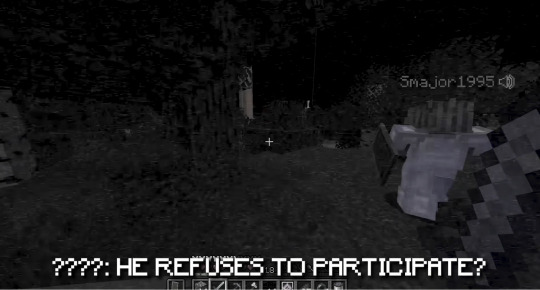


Pictured above: The Watchers, coping and seething
Of course as we know, the Watchers believing Grian would help them is a major oversight. Becoming a god doesn’t just fundamentally change who Grian is, and he definitely doesn’t want to consign his friends to an infinite death loop of suffering. That being said, I don’t think Grianhas truly gone ‘rogue’ so much as taken as much advantage as possible of his ‘deal’ with the Watchers. We can guess the Watchers promised to him some kind of control/leadership over his friends’ circumstances as long as he worked for them, which led to them giving him the keys to the Life Series. In other words, so long as he fulfils their requirements of things being a death game that will generate ‘food’ for them, and lets them revive everyone each loop, he gets to decide how the games go.
And we know exactly what Grian’s done with this: he created the green-yellow-red lives system, he creates a fun gimmick each season, he inserts himself into the game as a player, all to bring out the best and most creative side of his friends rather than the worst. The Boogeyman probably is the only gimmick the Watchers added on their own initiative (re: Martyn’s POV in Last Life) in order to make things more spicy. Probably Grian’s conversation with the Watchers each time goes, “hey, I got an idea on how to bring out the most creative ways for everyone to cause pain in each other, [comes up with some bullcrap justification for the game’s fun mechanics].” I like to think the Watchers were going to make the death games even more vicious, cruel and competitive, but because of Grian’s wrangling he’s convinced them that a slow burn from joy to horror creates better results, and they tolerate it as long as they see him useful.
Memories and Emotions
There is also one BIG detail of the Watchers’ plan I’d like to mention: Martyn claims that the Watchers do NOT erase the players’ memories. At the end of each season, they consume everyone’s emotions so that there’s no more angst/ill will towards each other, and they start each season afresh. The players remember what’s happened in past seasons, but they don’t continue to hold the pain and negative feelings they had towards each other.
I don’t buy this, for numerous reasons.
For one, Martyn has confirmed the Watchers ARE capable of removing people’s memories. The one memory they have outright altered was the ex-EVO players’ (Martyn, Jimmy, BigB etc.) memory of what happened to Grian: they don’t remember that Grian was taken to be turned into a Watcher, and instead remember it as him either going missing or dying after the Ender Dragon fight. All this presumably to not give away the Watchers’ schemes and to ensure they still listen to Grian as if nothing ever happened.
More importantly, however, memories are vital to humanity’s emotional experience and mental health. I am not an expert by any means, but there are studies showing how people with amnesia, PTSD or other conditions affecting memories have flashbacks/emotional reactions to trauma they don’t remember consciously. The Watchers have (supposedly) done something far more simplistic yet fantastic by just eating up everybody’s emotions. All this, even though they see humans as emotion factories, constantly able to generate emotions just by existing, by their ability to draw and create meaning through emotional experiences, and by creating memories – the clearest embodiment of a mortal’s attachment to time (which if you remember, I believe the Watchers have no concept of).
You cannot just tell a human to stop feelingcompletely (under normal circumstances anyway), but especially not if they remember something very very traumatic.
Besides, there ARE clear instances when some of the players remember the events of past seasons and are STILL not over them! Impulse and Tango still being bitter/distrustful after Bdubs betrayed each of them separately, Cleo distrusting BigB for the same reason, Scott referencing Flower Husbands a lot, Pearl feeling betrayed by Cleo/Scott when they supposedly broke up the Gaslight/Gatekeep/Girlboss trio at the start of DL, Bdubs’ “I wanna be your favorite son” in Secret Life, the list goes on. Note that I’ve only listed negative/bittersweet instances; there are plenty more cases of the players remembering past seasons and alliances positively which the Watchers may have ignored. The point is, if the Watchers truly consumed everyone’s emotions to the point of a clean slate, they haven’t exactly been thorough. Nor do I think it’s very conducive for them either – don’t they want players to have enduring, unending, unresolved pain, the sweetest of all (to them)?
No, I think the Watchers HAVE been erasing/suppressing the players’ memories – they’ve just been very selective which ones. Martyn’s said that the Watchers do not care what families or connections they separate so long as they get the people they want and the plans they want. I’m going to assume the players in my theory/the Eyes and Ears AU are exactly the same as their CC counterparts. In other words: they’ve stolen Grian away from his wife. They stole Martyn away from his and his daughter. Ditto with Skizz, Impulse, Tango etc. They stole Scar away from his family. Joel and Lizzie are the only couple they didn’t separate, perhaps because they needed both for their plans, and also so they can inflict the most torture on them by ripping them away from each other, over and over again. And in order to ensure the complete submissiveness of the players to the game, the Watchers have taken away their memories of their past lives, their families, basically anyone who isn’t a fellow player in the game. The Watchers don’t erase the memories of bonds between seasons, because it’s a pain to have to teach the humans how to play all over again, but they erase any memories they find disadvantageous to keeping the game running.
They might even go one step further: while they haven’t erased the players’ memories of who each other are (so as to not cause confusion), they do try to suppress important memories. Things like how they met, the times they confided in each other after a bad day, cried on each other’s shoulder, laughed in each other’s successes, the times they hung out with each other’s families. Imagine the different alliances constantly gravitating to each other, but never being able to remember why they care about each other so much. Imagine Bdubs’ “Come on, you know you and I go way back!” when trying to justify taking Cleo’s stuff, and Cleo laughs back, even though she can’t quite remember what exactly Bdubs has done to warrant that. Imagine Joel or Lizzie trying to remember why they loved each other so much.
They fight and kill some of their friends, and protect others, because…because why again? It’s for survival value, surely, so the Watchers whisper. It’s because the strong must congregate with the strong and leave the weak to die, surely. It’s because Martyn’s always been a loner, and always will be, and should remain so. So they tell him. So they whisper, this is a deathmatch for a reason.
Grian’s Fundamental Rebellion
I think all this is the real reason Grian is rebelling against the Watchers. The most immediate reason is obvious: he wants to free his friends from this death loop. But the deeper reason as to why he’s rebelled is that the Watchers are torturing and robbing his friends of their humanity. They’re taking a tight-knit group of friends who love and would do anything for each other, and turning them against each other in a cruel and unescapable death game. On TOP of this, the Watchers have constantly messed with their heads in order to make them obedient and submissive to their schemes and the worst of their human nature, trapping them in fear, pettiness and paranoia. Of course Grian is upset. Of course he wants to save them from this fate. It’s an insult to who he knows these people to be.
This all leaves Grian in a pretty precarious position. While outwardly the Watchers want to make him a lackey as the “game master”, both he and they know he really wants to save his friends (they probably see it as their ‘cattle’ showing a bit of resistance, which once again they need to suppress). And while on one hand he’s making the games fun to ease his friends’ pain and bring the best out of them, this is just a hotfix rather than a real solution. In order to really rescue the players, Grian’s got to get them to rebel against the Watchers as well. Refuse to play by the rules, by the expectation that they must murder and kill without mercy, without any attachment to their alliances or past friendships. Make everyone like Scott refusing to be the Boogeyman, or Skizz constantly trying to be wholesome (until the bloodlust gets the better of him anyway).
Ironically in order to achieve this, Grian’s best bet is to try to jog everyone’s lost memories of each other and the things they lost, both good and bad. But ultimately, this is going to make them (in the short term) suffer more. This is where you can insert all your Desert Duo/Flower Husband/whatever alliance you like most angst. But more practically, I like to imagine when “the cameras” are not watching, when Grian knows no one will notice or catch him, he sneaks around to the different alliances, even the ones he’s not part of, to ask them how they’re doing, if they remember anything from the past etc. (in a meta sense, the players edit and cut stuff from their videos all the time; who’s to say he isn’t trying to catch a quick chat while everyone’s mining?!) It also reflects in why Grian is constantly trying to make alliances with different people instead of just gravitate to one person, he needs to check on everyone and capitalize on every single opportunity. (besides the meta reason, being that cc!Grian wants to be creative, and sticking to the same person all the time isn’t very entertaining from a content creator perspective)
One last detail about the winners: I don’t have much to say about the fragments yet, because Martyn (sneaky boi) hasn’t yet revealed the significance of the fragments nor of their healing, although he has hinted Bad Things™ will happen if a player gets too fragmented. But I do think the winners are important: with the game finished, they give Grian a very short window of time to talk to one person directly, without Watcher interference. They’re always the last to be killed/swept away/revived by the Watchers, and I can imagine there’s a brief period of time when their souls are being transferred to The Void w/e where Grian can step in and interfere. In my theory, Grian passes on some sort of clue/push to the winners, as like a subtle message about what they can do to stand up to the Watchers. I’ll detail on what I think these individual messages were in part 2. Needless to say, 3rd Life was a traumatic experience for Grian for many reasons, but the nail in the coffin was the fact that he won, and therefore there was no way for him to pass a message onto anyone.
Conclusion
Hooooooo jeepers that was long @A@; Thank you so much for your patience reading this if you made it to the end, I really appreciate it. As I said, I’ve had these lore ideas bouncing in my head for a LONG time, and with the end of Secret Life I couldn’t get out of my head the different trends/symbolism that was popping out of an improv series. It honestly speaks a lot to how genius our favorite block dudes are at improv, that they can turn their improv nonsense into a coherent narrative. I really wanted to try my hand at fleshing out such a narrative, and with Martyn constantly drip-feeding lore to the fans, I had more than enough material to not just put out guesses but construct something a full XYZ. As I mentioned, I enjoy workshopping themes and characters a LOT more than just worldbuilding or “what if this or that” details in a vacuum, hence why I’ve written all that I have, so this was a fun exercise for me all around!
Next time in part 2 I talk about Character Development™, or character specific notes and details I’ve noticed and extrapolated from what we’ve seen of each individual player, as well as what their different arcs across the seasons mean for them within the lore. Stay tuned for another wordbarf!
Bonus list of works I was inspired by for this loredump:
Log Horizon
The Promised Neverland
Danganronpa (ironic as I’m not really a fan of this franchise, but the first game has an otherwise solid premise which I found really similar to the Life Series)
The Fate franchise (when Martyn asked “what’s Fate?” on the latest lore stream, let me tell you I couldn’t stop laughing; NO MARTYN DON’T GO INTO THE WEEB RABBIT HOLE)
Various amazing animatics from the Traffic fandom: Earth, Bang!, most of Melloz Heist’s works, and of course all the amazing fanart
Way too many conversations with my friends about fantasy species
#what have I done#trafficblr#traffic life#traffic smp#life series smp#life series#eyesandears#eyes and ears theory#inthelittlewood#thematic discussion#theorycrafting#3rd life smp#last life smp#double life smp#limited life smp#secret life smp#long post
91 notes
·
View notes
Text
not a whole proper analysis post cause im too tired for it rn but quick thoughts on nemona's house as analyzed by me.
(disclaimer: we're running with the idea that this set up is meant to mean something, because we are actually allowed to go in her house unlike most other buildings despite it being easy to shut it off. suspend ur disbelief and say that everything in nemona's house is set that way for a reason)
Nemona's house is fairly symmetrical, save for the aysemtrical stained glass window design and the way the balcony flowers fall. Aesthetically symmentrical, not obsessive exact symetry.
Nemona's house features 4 house staff, two butlers and two maids. None of them have any dialouge referencing Nemona herself.
One talks about how they dust a lot and dont get how more keeps appearing, one talks about how the master and mistress are away at the moment, and the other two have simple bubble dialouge that just references cleaning
There are 6 pokemon in nemona's house, none of which are paldean introductions
3 pachirisu, gible, goomy, and chansey
I cannot find any reason for there to be a pachirsu in this house let alone 3. please help.
the gible and goomy both are pseudo legends and may mean to imply more about how nemona's family is powerful and rich. nemona also personally has a goomy she trains to fight you, but these are seperate pokemon. goomy is also notable as the weakest dragon pokemon (so says dex entry i think its rad)
chansey is heavily assosicated with medicine, curing illness and injury. it's also known for having good tasting eggs, but the paldea pokedex entires focus on the medical and speed aspects so I'll lean into the med thing.
where the pachrisu are at the table and the dragons together to the side, chansey is placed on the right hand side in the living room. On my inital playthrough i thought it was sigficant from a gameplay perspective (like a healing chansey or something) but no such thing. it is promenantly placed though, so i like to think it's relavent
(personal theory running that nemona's poor stamina / whatevers up with her arm is enough of a thing for there to be a live in chansey to help her out. even if not that bad, enough that her parents decided it was important, maybe for image reasons? rich family and all...)
there are 3 art pieces, an abstract greninja player doesn't recognize as a greninja, some fish player finds pretty, and two eevee playing entitled sibling love. the eevee depicted are male and female, and could potentiallyyyyyyy be really vague forshadowing about nemona's older sister. likely also just,,, rich people have fancy art.
there are doors on either end of the hall, unopenable. window blinds are drawn.
a long couch and two chairs in the centeral area on a large rug, coffee table in the middle. the entire house is rather white (the colour) though with some black cabinets
clicking on said cabniets nets you dialouge about how organized they are
connecting the above to nemona's really clean dorm room suggests that nemona's orderliness is something she gets from her family
there's a bookshelf? low shelf, books you can't interact with. not much else to say.
i need to review some of her early dialouge but nemona does not seem to have any strong opinions on her house, with the only notable thing being that she doesn't think it's notable enough to have the final rival battle there. i know its like,, the game wants u to fight in mezagosa, but also.... they did not have to offer that as a dialouge option, nor make nemona respond the way she did. you can take her statement that that beach isn;t all to interesting in her opinion at face value or not (a implication she'd like to avoid her house??? probably not??), either way.
exterior wise still fancy very pretty, the garden's got a circle thing going on, noticeably more pristine than players house. again contrasting player, the entire thing is much more organized but also... lacking customization and personality.
it does have a battle court in the back <3 and a beach. rich girlie.
that's my nemona house notes if anyone has anything to add please do.
#trainer nemona#rival nemona#champion nemona#pokemon scarlet and violet#pokemon sv#pokemon scarvi#pokemon scarvio#pokemon scarlet#pokemon violet#pokemon scarlet and violet spoilers#kinda barely#pokemon scarvi spoilers#character analysis#analysis
34 notes
·
View notes
Note
*Shows Nagito, Seiko and Kanata a full broadcast footage of the battle between Kuripa and Katagiri* Any thoughts on this another instance of Kuripa’s absurd feats?

This gets more and more absurd the more I look at it.
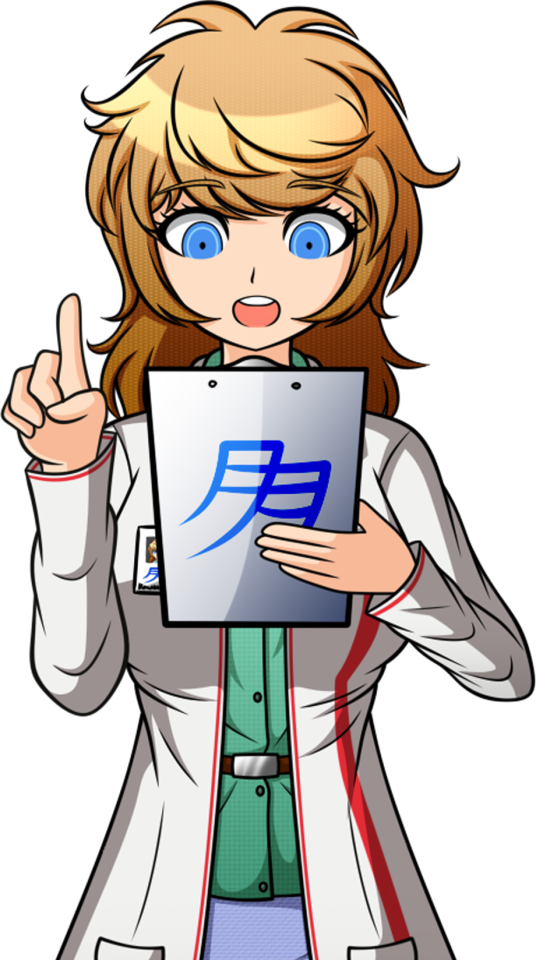
Hm...I doubt this strength has much to do with training or a constant regime.
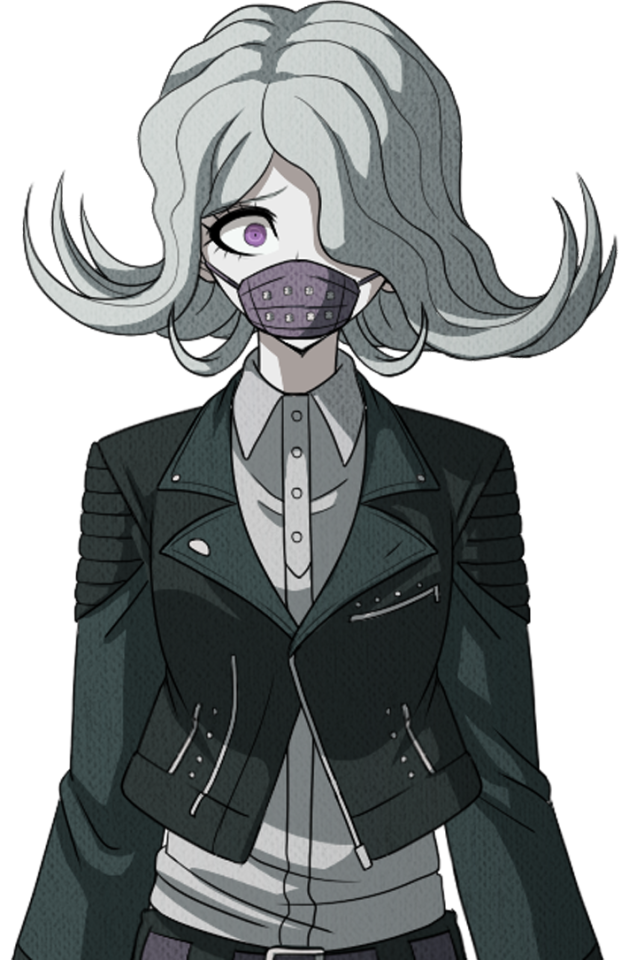
What do you mean?

I’ll need to do a proper analysis of course, but my theory right now is that Kuripa’s strength doesn’t originate from normal means.
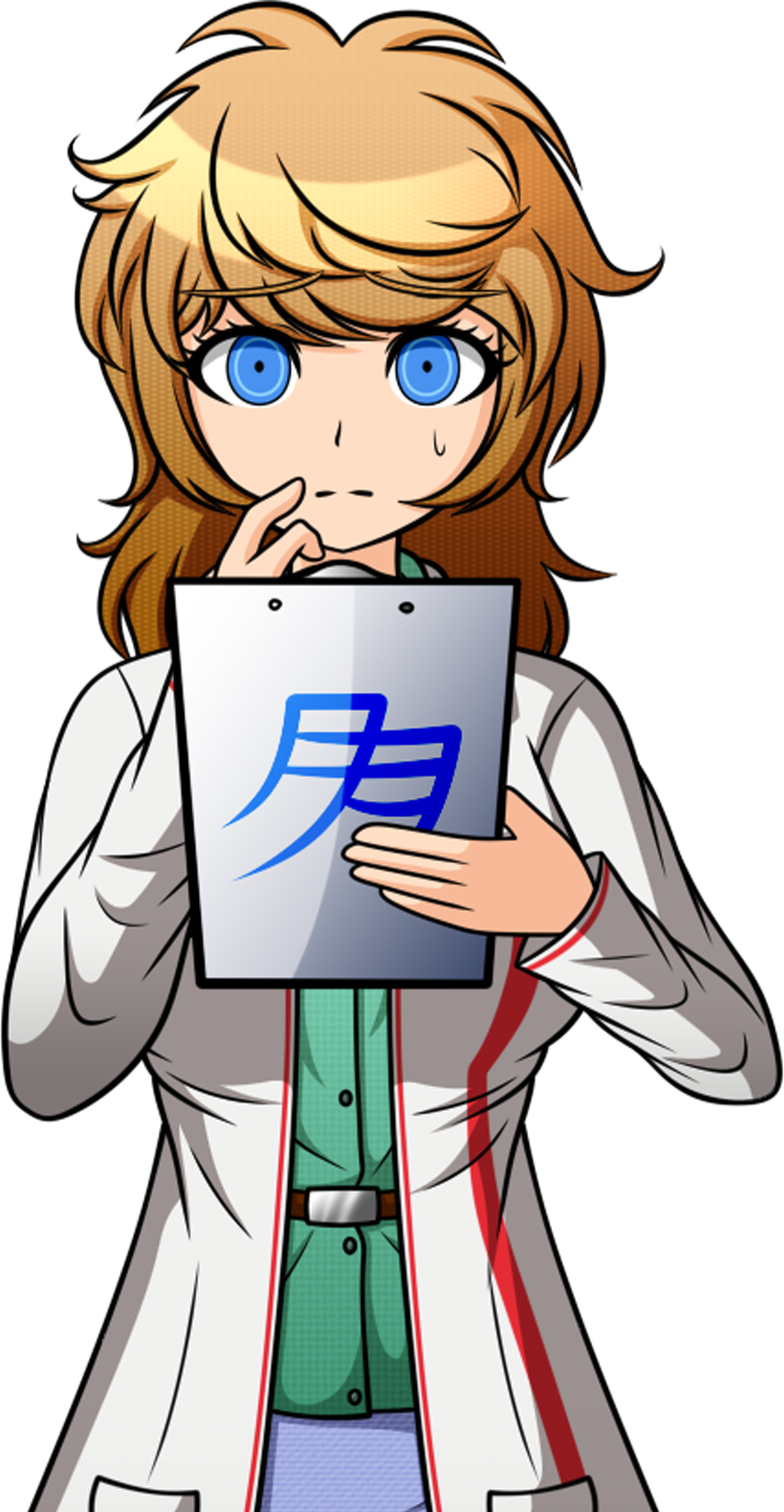
His frame is far too small for that. With his level of strength, he’s on par with Sakura Ogami and Mukuro Ikusaba, both of whom have a fair bit of muscle.

Kuripa obviously has muscle too, but not nearly enough to support the sheer amount of strength that he’s holding.
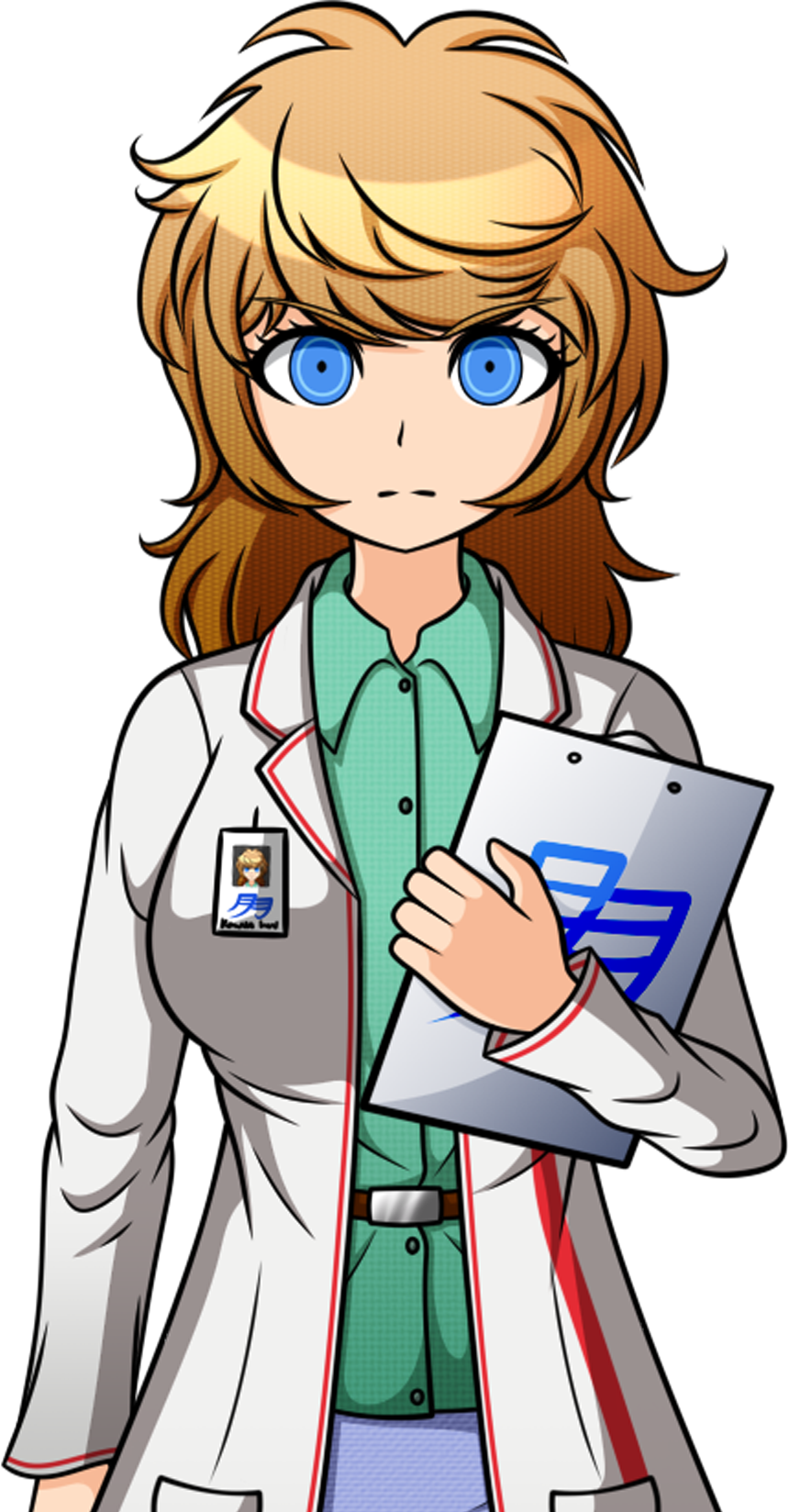
All things considered...his strength overpowers his body. Using that much power would tear his insides apart, not to the point where he’d suffer permanent damage, but to the point where the pain would make it far too much to move.
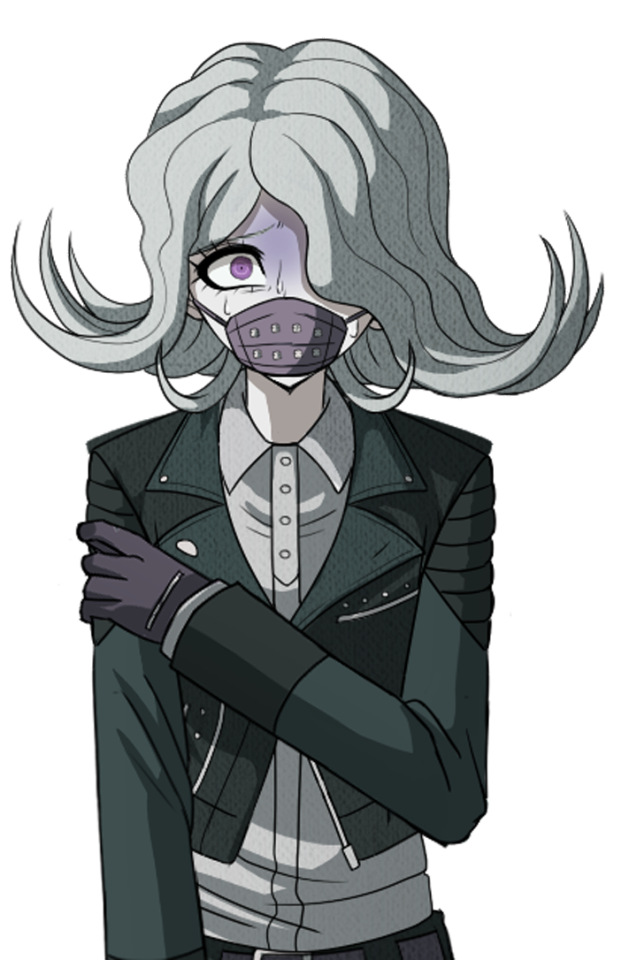
Sheer strength that overpowers his body? That sounds like...!

Me...and Hajime...And Fujimori...

Does that mean...Kuripa is an Ultimate Hope too...!?

...No, I don’t think so.

Being an Ultimate Hope does more than give you super strength. It makes you a complete genius and expert in almost EVERYTHING.
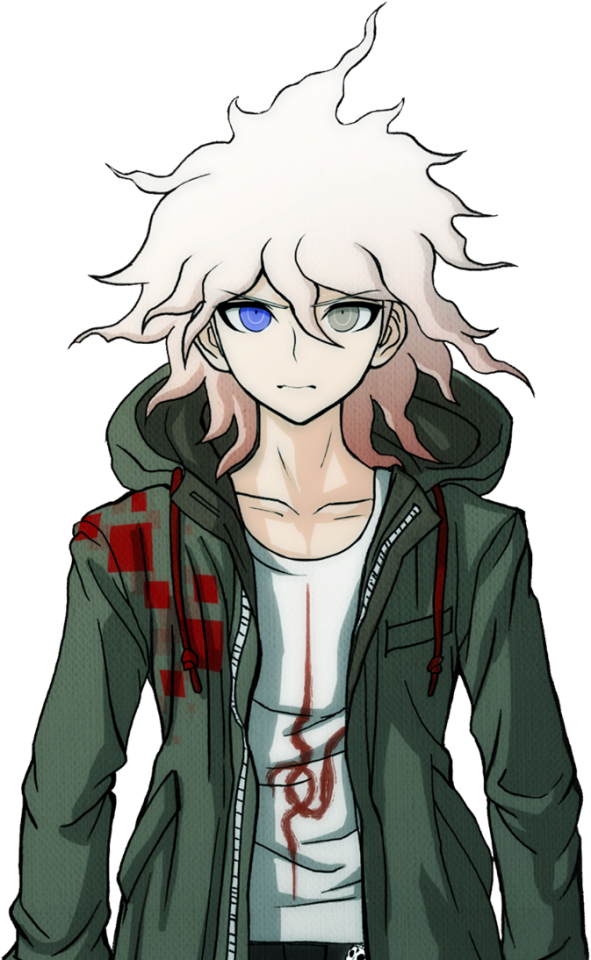
Kurafto is capable, more than most young men I’ve met, but he’s not perfect. And that alone means he couldn’t be an Ultimate Hope.

Plus...his eyes are the same color. And I know that doesn’t mean much, but every example I’ve seen has had that affliction.
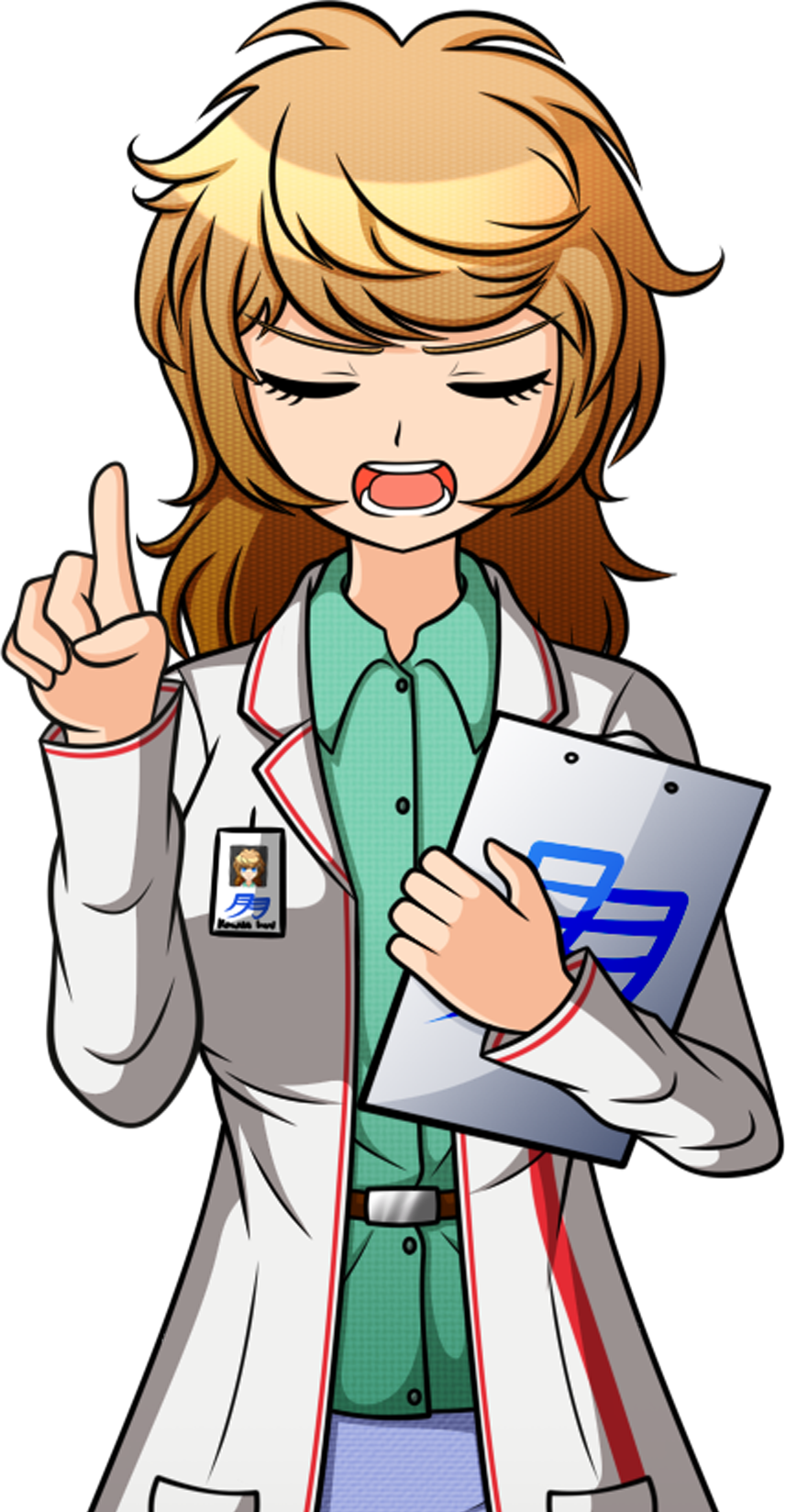
But Seiko is along the right lines. It’s not unusual to suspect that there was some outside altercation to him. Maybe involving drugs or medical procedures.

How much do you actually know about this young man?
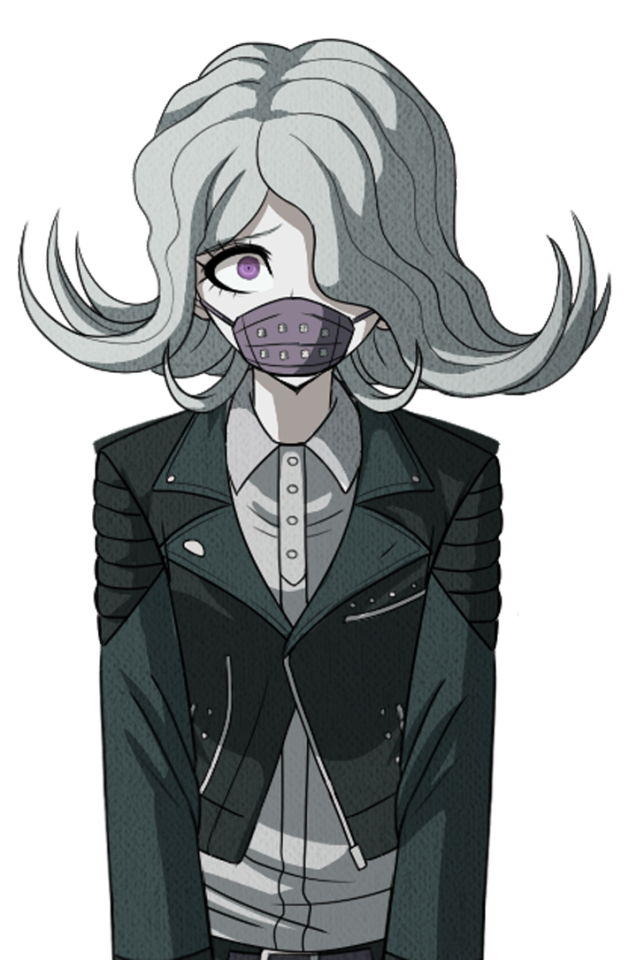
Very little Kanata...Frighteningly so...
#danganronpa survivor#danganronpa#danganronpa 3#dr3#danganronpa 2#dr2#danganronpa another 2#sdra2#seiko kimura#nagito komaeda#kanata inori#ask#the monster in me arc
5 notes
·
View notes
Text
Locate a Psychologist - What you should Consider

Psychologists are medical experts who are made up and associated in order to social sciences plus research. Individuals with mental issues move to these pros for diagnosis and treatment. Psychologists are usually further branched in to smaller categories using various specialties. In this article are things in order to consider in finding the right psychologist to assist you.
Trained psychologists are skilled in driving their clients by way of a wide scope regarding social problems including stress, relationships, job, family, school and so on. Coping with daily life for people with psychological issues may well not acquire through it on their own. It takes a professional psychologist to diagnose and find solution for that client to function optimally.
In United Kingdom, there are in addition various specialists that will appeal to specific internal needs. Chartered Psychologist will be the title given to all approved psychologists. Here are several associated with the types regarding psychologists to stroll you from the basics:
Clinical Individuals
In United Kingdom, Scientific psychologists deal using psychological issues this sort of as depression, relational problems, learning difficulties, depression, child in addition to family problems. Their scope of mindsets involves clinical checks such as checks, interviews or declaration of behaviour along with treatments involving person or group classes based on psychological models and analysis. Clinical psychologists happen to be usually employed in health and social proper care establishments such while hospitals, health zones and child in addition to adolescent mental wellness services to name a few.
Talk therapy Psychologist
Counselling individuals use a new approach wherein psychological theory and practices will be integrated is employed with therapeutic practice. Professionals under this kind of category have large self-awareness and efficient to interrelate personal and interpersonal mechanics translated to the therapeutic framework. Threat and mental analysis, planning and applying therapy, research and even multidisciplinary team function and facilitation will be some of the real key tasks these researchers do. Most counselling psychologists work found in industries, prison services, and commerce and in any quality of education through primary to educational institutions.
Educational Psychologists
Academic psychologists in Unified Kingdom mostly cater to younger customers who have studying difficulties, social problems or emotional dilemmas. Professionals under this particular category are targeted to enhancing the particular individual's learning talents. They also assist instructors or teachers to get a more suitable learning environment, specially for children, to maximize learning abilities through efficient and suited learning methods. Educative psychologists often work together with teachers and mother and father for most social or even educational establishments.
Click for source in selecting the best therapist with regard to you or your infant's needs, you might want to look at these qualities first:
1. Experience
Despite the fact that age is considered to be subjective, the quality and efficiency of therapy may rely upon your psychologist's feel. Though could find that having older psychologists gives out a more mature presence, expertise in dealing with a variety involving psychological cases can easily help young or perhaps old clients to get treated more effectively than those who happen to be not yet good adept with particular cases.
2. Certification
As what has been said prior, mindset is simply not a 'one size fits all' glove. Psychologists include specialized areas along with specific treatments. Throughout British, Chartered psychologists are thought accredited and even a highly qualified to take care of individuals with certain needs.
3. Environment
The atmosphere when you or your child will probably be treated is also a sign involving credibility. Professional researchers are often found in a health company or personal medical center with a calm atmosphere. The position should not end up being intimidating but calming to determine a very good rapport along with your psychologist for a more effective therapy process.
1 note
·
View note
Text
a discussion of jabberwock with team interaction hcs + deeper nash analysis
for anon who asked "Can we get some headcanons for jabberwock members or like headcanons when they're together? (its okay if it was jason or nash only)" and made me realise it's about time i get these guys' personalities down
note before we start: cause i didn't know their names until i wrote this
zack is the bald one, allen is the one with a headband, nick is the other white guy apart from nash.
team hcs
nick gets bullied for being under 6ft, but not by jason
nah good old jason teases all of them for being short fucks, emphasising that they’re all 5ft tall in comparison to him
he 100% lifts things out of the others' reach and then laughs for ages after when they try get them
unfortunately though, they’re all used to this and now just ignore him. either that or nash stares at him so intensely jason actually repents and hands it back
zack’s another one with a very good glare, but he’s used it too often on jason and it’s since stopped working.
also jason gives me ‘straightens his back as much as possible when getting measured so he’ll measure in as 7ft’ vibes
oh and he thinks he could wrestle a gator and win. i’ve got no explanation for that except for the fact you can't tell me it's ooc.
allen’s very protective over his white headband - it’s his lucky item - but he’d never let anyone know that
he’s confident in his abilities like the rest of them, but there’s nothing wrong with wearing a headband just in case
(nash knows anyway)
they watch nba matches together and do not shut up once throughout the entire match - lots of jeering, booing each other if someone criticises a player they like, lots of “i could do that”, lots of “get your fucking hand out of my popcorn do you want me to punch you in the face” etc
they used to all live together, but nash has since moved out. he was sick and tired of trying to make people do chores, as the only one who kept their room clean.
yeah the others’ house looks like a heap of trash but also very much “where’s my toothbrush?” “it’s in the third coke can by the orange peel behind the sink” *silence* “yeah thanks” *a minute later* “who the fuck has been using my toothbrush”
they’re all “bro your dribbling sucks why are you on this team loser” to one another, but also very protective (aka arrogant for one another) if anyone else Dared to criticise one of their teammates
then again, what kind of person would criticise jabberwock
half of the time he spends with jabberwock, nash is a Single Mother TM trying to get a bunch of man children to behave; the other half of the time, he's just as bad as the rest of them
i talk about this a lot but i get the feeling nash is an exceptionally hard worker, but at least he gets to let his hair down around his teammates sometimes
nash is also the only person jason thought was truly ‘strong’ at first sight
and nash is also the only person who can beat jason in a fight, and also the only person who can get nash to train, and also the only person who can.. [etc. you see my point].
(n.b jason calls himself the ‘almighty me’, nash says that ‘even god can’t beat me’. point made.)
you know how jason silver’s motto is “I have never thought”
imagine him proudly stating that, before zack adds with a straight face, “yeah cause nash does it for you.”
in short, the team would fall apart without nash.
although the team’s communication and coordination is very fine tuned, nash is the guy who keeps everything in order off the court to prevent what is essentially a team of aces ('main characters', if you will) from falling apart
they hang out together a lot, but do all have other friend groups that do not overlap
team bbqs
unofficial rule not to criticise anchovies on pizza because the one time nick did, nash snapped
however pineapple on pizza is fair game, even though zack quite likes it
more than once, jason has brought a girl home and nick has stolen her attention away with effortless trick shots, funky ball manoeuvring etc
more than once nick has had to trek to nash’s place (with a black eye) at midnight to have somewhere to sleep
do you see a correlation?
oh and everyone in the team has been walked in on by nash when they were naked with some girl
nash has absolutely no shame
he apologises to the girl with a charming albeit insincere tone, and then remains standing in front of the bed/couch until his teammate does what he expected of them
usually it involves not having come to practice
allen learnt a few (emphasis on ‘few’) words of japanese before they travelled to japan and was disappointed that he never got to use them
that said, one of those words was hentai
and now a quick analysis of some panels
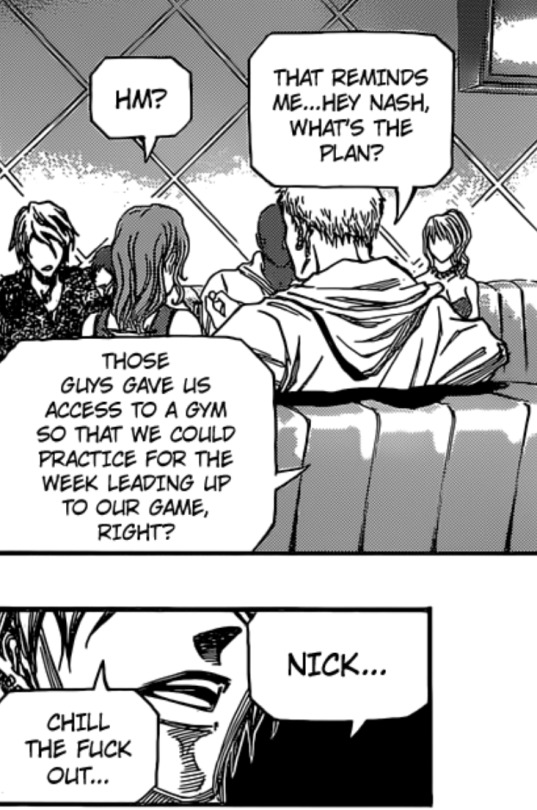
a) so there's at least one player who wasn't underestimating vorpal swords. if i were to overanalyse, i'd add that nick's wearing a hoodie (possibly athletic wear) whilst nash has a 'fancy' shirt on; perhaps nick wasn't expecting them to be going to host clubs instead of chilling/training?
b) i know what you're thinking: "how can you say nash is a hard worker when he didn't want to practice for the match". i reckon he was still pretty high on the complete and utter success of their previous match, that plus being around girls, encouraged him to have a more 'jason-y' personality. (either that or fujimaki didn't want to add too much depth/realism into nash's character bc he's unequivocally the villain, right? and obviously this helps with the plot and the jabberwock bad geniuses gom good geniuses rhetoric.)
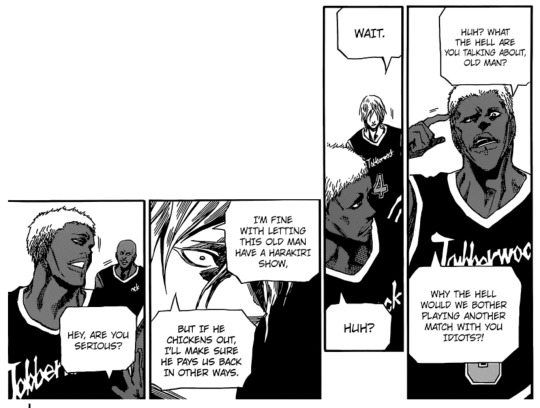
earlier, i mentioned how nash is the only one that could keep the team together, and is thus the undeniable head of the team; here's a clear example. you can see both jason and zack have no interest in continuing - if anything, there's disgust in their faces, kinda just saying "we spat on all of japan, now we can go home". whereas nash won't allow for the slightest of possibilities that there might exist a team stronger than them, and hence agrees to the match. the key thing here is that the others do as he says without too much fuss.
another thing to note is nash's reference to harakiri. now what can we make of that, alongside his proficiency in japanese, in relation to his character? the way i see it, he's either a weeb or possibly has some japanese lineage. (you could spin that even further and say his mother was japanese, taught him the language, then abandoned him, and hence his almost excessive hatred/mockery of the japanese people.) (is that why he wanted to do another match in japan..?)
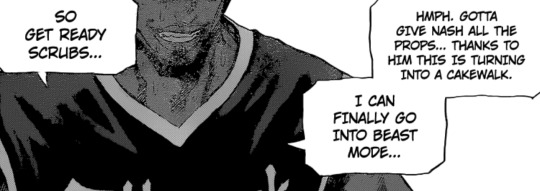
just a quick point. "thanks to him" - jason isn't so superior as to think that he could win this match effortlessly without nash's support. links pretty nicely with my earlier idea about how nash is the only person jason has always considered 100% strong.
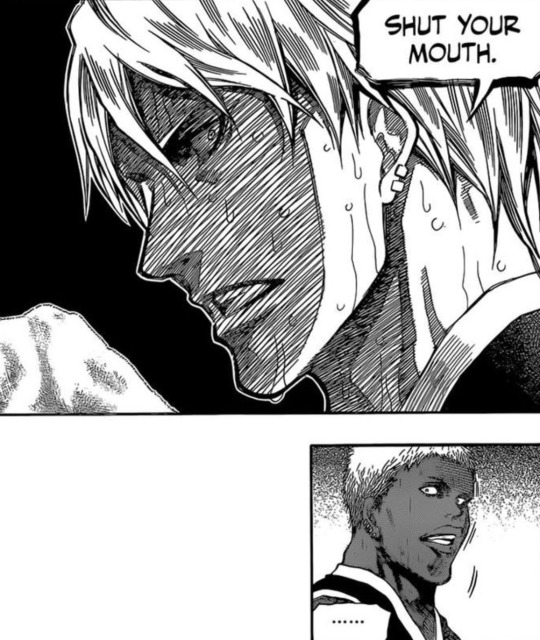
yet another point about how nash is the strongest of the team in pretty much every way you can think of. you know how scary/powerful you have to be to shut jason up (after he's getting real pissed from being prevented from scoring?)

i personally think this is a pretty important panel, though i've never seen anyone mention it before. did nash grow up training in a professional basketball training situation, as opposed to growing up playing streetball like i suspect the others did? well, to answer that question, imma bring in another panel.

here we see visible rage on nick, zack and jason's faces - they can't accept their loss, which is fair enough. but i'd argue that nash's face seems to depict sadness more than it does anger like to rest of them, look at how downturned his mouth is - and he's looking away from the 'camera', as if hiding his shame.
when you combine that with what he says here, i have no doubt that this is someone who has experienced some proper lows in basketball - as would be expected from someone who's played 'properly'. he's possibly not even a prodigy like the rest of them - compare jason's motto with his. "i have never thought" versus "do not suppose opportunity will knock twice at your door".
there's various lines of thinking you could design with this - he might have been trained by alex (hence, himuro having heard of jabberwock, though he should have known of a team as popular of jabberwock regardless), he might have grown up with professional basketballer parents etc. but here's my own little theory:
nash received serious basketball training from early on - maybe because his parents were living vicariously through him, or maybe he always loved the sport and wanted to be no1. so there he was training away, but, as he grew older, it started getting all a bit too much.
he didn't want to dedicate his entire life to basketball. after all, his hobby is water sports and his speciality is boxing; that's a lot of different things to be keeping up with, whereas the pipeline for promising athletes demands people focus solely on basketball. as a result, nash become bitter: stopped attending practice regularly, got in trouble for trash talk of increasing severity, etc.
result was he was kicked out of the program.
only when he was no longer playing basketball again, did he realise how much he missed it. and hence he got into streetball, where he was tremendously successful as someone with so much training, 'elite skills', and the overly confident attitude to boot.
then, one fateful day, he met jason and the rest is history.
#jabberwock deserved some love and they got it!#i wasted too much time on this but happy jabberwock sunday everyone#but i did like rereading extra game#it's all about those little details man#jabberwock#allen#zack#nick#nash gold jr#jason silver#knb#kuroko no basket#kuroko no basuke#kirisaki daichi scenarios#hcs#headcanons#extra game#knb extra game#imagines#scenarios#manga panels#mangacaps#character analysis#team interactions
151 notes
·
View notes
Text
The Infamous Case of D.B. Cooper
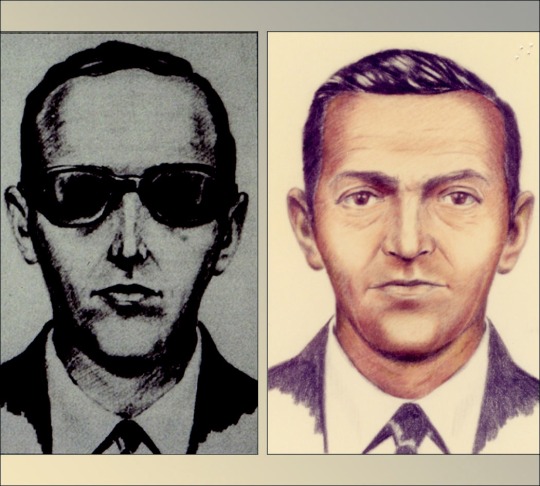
March 14, 2021
This case began on November 24, 1971 when a man who went by the name of Dan Cooper went up to the counter of Northwest Orient Airlines in Portland, Oregon and asked to buy a one-way ticket to Seattle Washington. The man paid for this ticket in cash. The name D.B. Cooper comes from a miscommunication, supposedly the man named himself as Dan but his ticket was printed out as saying D.B. Cooper instead.
Cooper was very quiet and described as a man in his mid-40′s, wearing a business suit with a black tie and white shirt. While waiting for the plane to take off, the man ordered a bourbon and soda. A little after 3 pm the strange man handed the stewardess, Florence Schaffner, a note which claimed he had a bomb in his briefcase and demanded her to sit down with him.
The stewardess, needing to remain calm, sat down next to D.B. as he wrote a note for her to take to the captain. He demanded to have 4 parachutes and $200,000 in twenty dollar bills. I think we all know what his threat was if they plane did not meet his demands.
Knowing that there was 36 passengers on the plane and several crew members, they had no choice but to give the man what he wanted. The flight eventually landed in Seattle and all of the passengers were let off unharmed. D.B. Cooper kept several crew members on the plane with him as they were heading for their next destination, Mexico City.
A little after 8 pm when the plane was somewhere between Seattle and Reno, the man known as D.B. Cooper jumped out of the back of the plane with a parachute and his ransom money. The pilots landed the plane safely and no one was hurt, but D.B. Cooper was never seen again.
There have been a lot of suspects over the years of who this older, put together, strange man was. One of the most popular suspects was a man who went by the name of Richard Floyd McCoy. He came to be a suspect because he attempted to hijack a plane in similar fashion to D.B. Cooper a few months later on April 7, 1972. He demanded four parachutes and $500,000. McCoy was arrested but eventually let go because he did not match the identical descriptions two of the flight attendants gave.
What is such a mysterious about this case is that we have a fairly accurate and good description of D.B. Cooper because the stewardess that sat and talked to him had spent a considerable amount of time with him and had gotten a good look at his face and features.
D.B. Cooper is suspected to have possibly been an Air Force veteran at some point because he was quite familiar with the Seattle area and even recognized the city of Tacoma while the plane was still in motion. Others also believe he used the alias Dan Cooper name after a fictional hero in a Belgian comic books series. The fictional Dan Cooper was a test pilot who had numerous heroic adventures even ones that involved parachuting.
Others believe D.B. Cooper did not actually survive the jump. Most think this because he wasn’t wearing proper clothing or footwear for a jump of that extent, as well as he would of been jumping out of the plane in a dark and wooded area, which would be even difficult for an expert which most believe he was not.
Another well known suspect is a man named Kenneth Peter Christiansen, after his brother Lyle Christiansen watched a documentary on the D.B. Cooper case in 2003. Lyle was convinced that his brother was Cooper for multiple reasons. Kenneth Christiansen enlisted in the army in 1944 and was a trained paratrooper. He also joined the Northwest Orient in 1954 working as a mechanic, a flight attendant and then a purser based in Seattle. He would of been 45 years old at the time of the hijacking, matching the supposed age of D.B. Cooper but he was shorter, thinner and lighter than the description given. Christiansen also smoked and preferred bourbon like Cooper. Florence Schaffner, the stewardess who spent a lot of time with Cooper said that Kenneth Christiansen matched the description more than any of the other suspects she had seen, though she could not 100% identify him as being Cooper.
Here is where things get really creepy. Kenneth Christiansen had purchased a house in cash a few months after the hijacking took place and when he was dying of cancer in 1994 he told his brother Lyle that there was something he should know, but that he couldn’t tell him what it was. Lyle said he never pressed his brother for more information. After Kenneth died his family found several news clippings of Northwest Orient news that started around the time he was hired in the 1950′s and stopped right before the hijacking took place in 1971. Kenneth worked for the airline part-time for several years after 1971 though he supposedly never saved another paper clipping.
So now it’s time to debunk some findings. Apparently, according to the Wikipedia page (which isn’t the greatest source ever I know), some web sleuths actually discovered that Kenneth Christiansen never bought a house with cash after the hijacking, he had a mortgage on a house and took 17 years to pay it off. Kenneth’s family also claimed they found around $200,000 in accounts after his death, though sleuths found that he had actually sold 2 dozen acres of land for large amounts of money which would explain why he had so much money on him in the mid 1990′s around the time of his death. However, this is just from a source I found, I have not looked into these debunking theories.
Another suspect goes by the name of Lynn Doyle Cooper, or L.D. Cooper. Born in 1931, he was a leather worker and Korean War veteran. In 2011 his niece Marla Cooper proposed he was a potential suspect. Marla was a child at the time but she remembers her uncle and another uncle planning something “mischievous” involving the use of walkie talkies at her grandmother’s house in Sisters, Oregon on November 23, 1971. The next day the plane hijacking took place and thought L.D. Cooper was supposedly turkey hunting that day he came home wearing a bloody shirt and said he had been in an auto accident. Marla claims both her parents suspected L.D. of being D.B. Cooper and she also said her uncle was obsessed with the comic book hero Dan Cooper mentioned previously. L.D. Cooper would’ve matched the age D.B. Cooper was described as but he died in 1999 taking whatever secrets he had with him. The FBI added his DNA to the system to see if it was a match from the unknown DNA they had from D.B. Cooper’s tie, but it did not match though this doesn’t mean he wasn’t the mysterious hijacker.
There are so many more interesting suspects with lots of evidence suggesting they very well could be D.B. Cooper, I might make a second post strictly discussing some other interesting suspects.
In February 1980 almost 9 years after the original hijacking when a young boy named Brian Ingram found a wad of twenty dollar bills, $5,800 in total, along the banks of the Columbia River and the serial number on the bills matched the serial number of the bills given to D.B. Cooper. However, I personally think (and kind of hope) he survived because no body has ever been found. I am kind of rooting for this guy because this story sounds so unreal.
In 2017 a group of volunteer investigators found what appeared to be an old parachute strap in the Pacific Northwest. In August 2017 a piece of foam that was suspected to be part of D.B. Cooper’s backpack was found.
FBI agents recovered 66 unidentified fingerprints aboard the plane as well as finding Cooper’s black clip on tie, his tie clip and two of the four parachutes, one being opened.
The FBI officially suspended the active investigation in July 2016, almost 45 years after the hijacking, however they ask if anyone has any physical evidence that might emerge to submit it for analysis. All of the evidence is open to the public.
The mystery of D.B. Cooper is the only unsolved case of air piracy in commercial aviation history. Unless someone confesses on their death bed, I say the identity of D.B. Cooper will remain unsolved. The likelihood of someone confessing to this on their deathbed is unlikely though because if the man was in his mid-40′s in 1971 he would be in his 90′s now if he is still alive.
19 notes
·
View notes
Note
my mom believes in homeopathy and i don't know what to do. our town homeopath died not so long ago so she won't be recommending him to people anymore, but she still believes in the system. apparently he cured my brother's hyperthyroidism and my nephew's alopecia. she says that he went to tons of real doctors and the only thing that worked was homeopathy. that left me speechless. im still skeptical but how do you explain that? and if it's a placebo but it works, then why shouldn't we use it?
This answer is going to be a long one, so I apologize in advance. Apologies also for how long this has taken for me to write and publish. As always, I want to make sure that I answer every part of this question with thought, care, and sources. To make it easier to navigate, I'm going to add headers for each section.
What are Homeopathic "Remedies"?
The first thing I want to do is clarify what homeopathic "remedies" actually are and what the theory behind homeopathy is. Often, I think we imagine that homeopathy is just herbalism- using "natural" plants as "medicine". By itself, doing that is kind of a dubious approach to treating illness, but it can be at least somewhat effective. It's important to understand that that's not what homeopathy is.
Homeopathy is an alternative "medicine" practice created in 1796 by Samuel Hahnemann as a reaction to the mainstream medicine of the late 18th century.
Hahnemann's homeopathy is based on the doctrine that "like cures like"- that a disease can be cured by a substance that produces similar symptoms to that disease in healthy people. In order to prevent those symptoms from occurring as a result of the "remedy", homeopathy also subscribes to something called the “law of minimum dose”—the notion that the lower the dose of the medication, the greater its effectiveness. This is inconsistent with what science knows about dose-response relationships, where the effect of a dose is reliant on the concentration of the active ingredient. Many homeopathic products are so diluted that no molecules of the original active ingredient remain. Modern advocates of homeopathy have suggested that water "remembers" the substances mixed in it, and transmits the effect of those substances when it's consumed. This isn't consistent with our scientific understanding of matter.
Homeopathy also traditionally includes the concept of "miasms" as the "infectious principle" behind illnesses (including illnesses like epilepsy, cancer, deafness, and cataracts). Miasms are a negative force (imagined to be kind of like a cloud or fog) that serve no purpose other than to make humans miserable and ultimately kill them. Traditionally, homeopaths believe that individual symptoms should not be alleviated, since it will only drive the miasm deeper and the miasm will "manifest itself as diseases of the internal organs". They believe that in order to cure illness, the miasm must be removed from the "vital force". The concept of miasms have become less popular in modern times, but there are still homeopaths who base their practice around it.
It's important to know that none of these ideas are backed by the scientific method, nor have they been shown to be effective when subjected to the scientific method. That said, you can kind of see concepts in homeopathy that are 18th century explanations for phenomena that are real.
For example, "like cures like" and "law of minimum dose" is actually kind of how vaccines work: you give a very small bit ("a minimum dose") of a disease-causing microorganism or an agent that resembles a disease-causing microorganism ("like cures like"), which trains the body's immune system to recognize that agent as a threat. Another example is airborne infectious diseases. It is possible to get certain illnesses (such as COVID-19, measles, chickenpox, the flu, and norovirus) if you encounter a "miasm" (what we now call droplets of an airborne infectious disease).
The problem with homeopathy is that it's not the 18th century anymore. Science has moved on from using "like cures like" and "miasms" as explanations for illness. We know that "like cures like" is not an effective treatment for every illness, and we know that not all illnesses are "miasms" (airborne). We have a better grasp of things like genetics, viruses, infections, and environmental factors that allow us to more effectively understand what causes illnesses and how to provide effective, reliable treatments for those illnesses.
What's the Harm? Problems with Homeopathic "Remedies"
Moving on, I want to start with
your last question first. If homeopathic "remedies" are a placebo and they work, why shouldn't we use them? What's the harm? There are three main problems with using homeopathic "remedies" that I want to discuss.
The first and most important answer is just that they don't work. I'll do a deeper dive on the evidence against homeopathic "remedies" and why homeopathic "remedies" don't work in a second, but for now, just know that the first problem is that homeopathy can't fix the health problems people are looking to solve. The placebo effect is pretty limited in its scope; it generally works for subjective, patient-reported outcomes such as pain and nausea, but it doesn't usually affect the actual disease. For example, when the placebo effect is used to treat insomnia, patients perceive that they've slept better, but it doesn't actually improve the amount of time it takes a person to fall asleep.
The second problem is that homeopathic "remedies" aren't always harmless. While they're generally "unlikely to provoke severe adverse reactions", there have been cases of those "remedies" being taken off of the market because they've caused serious symptoms such as seizures. In the US, homeopathic "remedies" aren't overseen by the FDA in the same what that medications are. As a result, there's no assurance that the substance you think you're getting is what you're actually getting. Frequently, "remedies" are a waste of money because they don't have enough of the active ingredient to work at all. This is especially true if the product you're getting is a "dilution", which intentionally gets rid of the molecules of the original material as a result of the "law of minimum dose", but it can even be true of things like nutritional supplements that you can buy at CVS or Walmart. In the US, there's no group tasked with objectively testing the claims made by companies that sell "remedies", and there's no group making sure that "remedies" don't have ingredients in them that are unsafe. Belladonna, arsenic, and poison ivy have been found at detectable levels in homeopathic "remedies", and cases of arsenic poisoning in particular have occurred. But because homeopathic products are marketed as if they're "drugs", many people assume they wouldn't be allowed to be sold if they weren't good, if they didn't work, or if they were advertising falsely, and so they keep buying them.
If you see an individual homeopath, this problem is compounded. "Homeopath" is not a protected term in the US, meaning that anyone can claim to be one. In turn, this means that there's no licensing board that oversees their work, no professional association or government agency that keeps them accountable for their mistakes, and no educational credentials that they need to begin practicing. Your local homeopath may have no background in biology, medicine, chemistry, pharmacology, or even homeopathic or alternative medicine practices. They can literally just be a person, one who you're trusting to cure your ailments and to not accidentally poison you in the process.
The last issue I want to bring up is that homeopathy is often (although not always) viewed as being an acceptable replacement for evidence-backed medicine. This means that often, people who see a homeopath aren't seeing a medical doctor, and their symptoms aren't being treated by evidence-based medicine. By not taking an evidence-based approach to intervening in illness, outcomes are significantly worsened, especially for serious, life-threatening conditions such as cancer. Patients have died as a result of opting to take a homeopathic approach to illness instead of receiving proper treatment for diseases that could have been easily managed by evidence-backed medicine.
This becomes an even bigger problem when it comes to public health issues. People who view homeopathy as being equal to or better than evidence-backed medicine are more likely to be anti-vaxxers and to not vaccinate their children. Reductions in vaccination rates have led to resurgences of diseases that had previously
been close to elimination. The US has seen a resurgence of whooping cough, measles, and tetanus as a result of anti-vax sentiment. Those resurgences directly endanger people who cannot be vaccinated due to chronic health issues, people with allergies to ingredients in vaccines, and people who cannot choose to be vaccinated, such as children.
How Effective Are Homeopathic "Remedies"?
Next, let's talk about studies that look into the efficacy of homeopathic "remedies". Government level reviews of homeopathic "remedies" have been conducted by the UK, Australia, and the European Academies' Science Advisory Council. The UK's study found that there was "no compelling evidence of effect". Australia conducted a meta-analysis of 1800 papers, and found that "there were no health conditions for which there was reliable evidence that homeopathy was effective." EASAC found that there was a lack of evidence that homeopathic products are effective, and raised concerns about quality control.
Additionally, there have been systemic reviews and meta-analyses of the efficacy of homeopathic "remedies" from doctors, universities, and medical researchers. In 2005, The Lancet (one of the world's oldest, best-known, and respected medical journals) published a meta-analysis looking at the efficacy of homeopathy. Basically, that means that they looked at data from 110 homeopathy trials. These trials were included in the study because they had a completely randomized set of patients who don't know whether they were getting a "homeopathic treatment" or a placebo pill. This type of "blinded" study allows researchers to see how effective the intervention (in this case, a homeopathic "treatment") actually is. Their findings were, "compatible with the notion that the clinical effects of homeopathy are placebo effects". Meta-analyses have also been conducted on the application of homeopathy for individual diseases, including cancer, ADHD, asthma, insomnia, fibromyalgia, dementia, IBS, osteoarthritis, migraines, ecchymosis and edema, and dermatological conditions, and all have found the same result.
The UK's NHS, the American Medical Association, the Federation of American Societies for Experimental Biology, the National Health Service and Medical Research Council of Australia, the World Health Organization, the American College of Medical Toxicology, the American Academy of Clinical Toxicology, the Russian Academy of Sciences, and even the acting deputy director of the National Center for Complementary and Alternative Medicine have all come out against the use of homeopathy, saying that there's "no good quality evidence that homeopathy is effective as treatment for any health condition", recommending that no one use homeopathic "treatments" for disease or as a preventative health measure, and noting that there is evidence that using these treatments can produce harm and indirect health risks.
But it Seems Like it Works! What Else Could Have Happened?
In terms of what happened with your brother's hyperthyroidism and your nephew's alopecia, I'm perfectly happy to admit that I have no idea. I don't know what the homeopath gave them or what else they were taking or what else they were doing during that period of time that might have changed their health status. I can offer you some hypotheses (and I will in a second), but I don't know, and that's okay. What I do know about is the current state of research on homeopathic "remedies" overall, and how it holds up when subjected to the scientific method.
There are a few common culprits for why homeopathy may seem to work. I'm going to go over those now, and then I'll dig into some theories for what may have happened with your brother and nephew. These culprits include:
Placebo effect- we talked about this one earlier, but essentially, if people believe that a "treatment" will work, they're also more likely to believe the "treatment" worked after taking it. As a result, they will report feeling better on subjective measures such as pain.
Natural healing- with time, the body can sometimes heal itself without medical assistance. This is most common for things like viruses.
Therapeutic effect of consultation- care, concern, and reassurance from a compassionate caregiver can have a positive impact on the patient's assessment of their well-being, even if objective assessments of their well-being stay the same.
Regression towards the mean- many conditions and diseases are cyclical. The patient may notice a decrease in symptoms that they attribute to homeopathic "remedies", but are actually just a result of moving to a different stage of the disease cycle.
Cessation of unpleasant treatment- a homeopath may suggest that patients stop receiving medical treatment. Medical treatments can sometimes have unpleasant side effects, and so halting those treatments can make the patient feel better in the short term. The patient attributes the decrease in symptoms to the homeopathic "remedy" but it's actually that they stopped taking a medication that has side effects. In the short term, this feels good, but in the long term it is destructive because the disease isn't being treated.
Non-homeopathic treatment- the patient is also receiving medical care, and the medical care is responsible for the decrease in symptoms, not the homeopathic "remedy".
Unrecognized treatments- an unrelated food, exercise, environmental agent, treatment for a different ailment, etc. is also treating the patient's medical condition and is responsible for the decrease in symptoms.
For alopecia areata (hair loss in patches on the scalp), spontaneous remission is actually more common than you might expect. In most cases that begin with a small number of patches of hair loss, hair grows back after a few months to a year. It's possible that your nephew's hair just... grew back, especially if time had passed. It's also possible your nephew's parents were treating his alopecia other ways (minoxidil, contact immunotherapy, corticosteroids, a gluten free diet if the alopecia was associated with celiac disease) and just didn't tell you or your mum.
Hyperthyroidism is a bit more difficult to guess at. It could be that your brother's medical doctors switched him to a different medication that did work or changed his dosage. If you're sure that's not it, it could be that he switched his diet to one that's low iodine and low in caffeine. Research suggests that, although a low iodine diet cannot cure hyperthyroidism, it can reduce or alleviate the symptoms in some people. If your brother went vegetarian, vegan, or stopped eating fish, that could be the culprit. If he stopped taking a multivitamin that contains iodine, that could be it. If he started eating a ton of foods high in goitrogens (soy, cassava, cabbage, cauliflower), that could also contribute to what happened, since goitrogens interfere with the uptake of iodine in the thyroid. It's also possible he was misdiagnosed, but if it's true that he went to "tons of real doctors", that seems fairly unlikely. Again, all of these are just guesses for the purpose of illustrating what confounding factors may have been present.
I think the bottom line with stories like these are that you're hearing them secondhand. You don't know how many doctors your nephew or brother saw, or the quality of those doctors, or what they diagnosed, or what they prescribed, or how many different lifestyle changes they tried. You don't know what the homeopath prescribed them, or if they took it. You're hearing a story of miracles through the mouth of a believer, and that can make it difficult to know what is and isn't true (in a medically accurate kind of way). It's possible that your mum's homeopath has stumbled upon a treatment for alopecia and one for hyperthyroidism that work better than traditional medicine. I hope that's true. We can always use better treatments, especially for difficult-to-cure conditions like alopecia. But I think it's more likely that there's just some piece of information you weren't given.
What do I do?
Getting to your original question, there's not a ton of evidence-backed research (that I could find, at least) for how to change people's minds about homeopathy, but there is data on changing people's minds with regard to vaccines, and I think using those tactics may work in both cases.
What to do about your mum's beliefs in homeopathy depend on where those beliefs come from, how entrenched they are, and how it's impacting her life. If she's just someone who tries lifestyle changes and supplements from CVS first before going to a doctor and if she believes in vaccination, homeopathy is a waste of time and money, but it's probably not too big of a problem. In that case, it may not be worth pushing her about it, especially if she hasn't found a new homeopath after her old one passed away. If she's anti-vax and/or refuses to see medical doctors, that's a bigger problem, and it's worth having a conversation about.
Changing her views is likely to take time, so be prepared to have at least a few conversations about these topics. And be prepared to step away from the conversation and resume it at a later time if it becomes too contentious. Start by asking her about her fears with regard to evidence-backed medicine. Do your best to be curious rather than judgmental in those conversations and to be a good listener. Respect is the most important tool in changing a person's mind, so try not to interrupt, be dismissive, or combat her beliefs off the bat. Affirm her right to have questions (but not the validity of the actual concern), and
try to say positive things about her in the conversation (for example, "I can see you really want to do everything you can to keep yourself healthy and safe"). Focus on her feelings, not facts.
By trying to understand where she's coming from, you can begin to understand where her hesitations are and how those fears might be remedied. For example, a lot of people who believe in homeopathy do so in part because they feel like homeopathic practitioners listen to them, respect them, and care about them more than medical doctors do. They've usually had a bad experience with medical doctors. Knowing where her fears lie gives you a better idea of what she needs in a medical context, and can help you figure out how to dispel misconceptions she has about medicine or find alternatives that actually work. In the case of feeling like medical doctors don't respect her, you may be able to help your mum find a medical doctor who will spend longer with her and really listen to what she has to say.
You can try asking her follow-up questions that allow her to investigate her own beliefs. For example, you might try asking about Hahnemann's ideas of "like cures like", "the law of minimum dose" or "water memory" and see how she reacts. Many people, even those who use homeopathic "remedies", don't know the principles that it's based on, and will eventually express skepticism when asked to explain them. It's tempting to try and combat pseudoscience with facts, but studies suggest that presenting facts makes people more likely to cling to their original beliefs. It's better to let people investigate their beliefs on their own through asking the right questions.
You might also try this technique. Ask her how likely she would be to see a medical doctor/get a vaccine, on a scale of 0-10. If she says 1 or 0, this strategy isn't going to work. But if she says 2 or 3, then you can ask her why she's not a 0. Why is she not fully saying she won't see a medical doctor or get a vaccine? This forces her to explain what she thinks the positives of medical doctors/vaccinations are. Now you're on the same side; you both think there are some positives to the medical profession. Reinforce those ideas when you talk to her. From there, you can ask what would make her more likely to see a medical doctor/get a vaccine, and when she answers, you can point to the places where those things exist in the medical field.
If nothing else works, you could try finding ways to make evidence-based medicine and vaccination compatible with her beliefs. Perhaps you could try using the language of homeopathy to explain medical issues and their treatments. For example, with COVID, it might work to tell her that COVID is a miasm, and that researchers used "like cures like" and the “law of minimum dose” to create a vaccine to remove the miasm from the "vital force". All of that is technically true, at least in a sense. It's just not the language scientists would use to describe what happens.
To Sum It Up
The medical establishment definitely has issues it needs to work on. The lack of compassionate, respectful care in many medical settings is a real problem, and it has real consequences. There are some situations in which a placebo is a potentially valid approach to treatment. But the answer is not to encourage homeopathy. It's to do more research, develop better drugs, and change the ways that doctors interact with their patients. Homeopathy doesn't work, and it does potentially have harmful side effects, both on a personal and societal level. The way we can combat homeopathy is to be curious and respectful, to help people identify and work through their concerns, and to offer them solutions to their medical problems that take those concerns into account.
3 notes
·
View notes
Note
1) ice skating dates! i like Shouto not knowing how to skate so Izuku shows him and the reverse as well! 2) As pro heroes they leave dumb hints on the internet about their relationship! like really dumb though. Shouto just has a social media account that's called Pro_Hero_Deku's_Husband and just posts candid pictures of Izuku. everyone thinks the user is a crazy stalker, but its just Shouto. 3) in highschool Shouto would be taller for kisses, but then when they get older Izuku is the taller one
(I am going to post several of the messages I have received together! Thank you for sending them in! These made me very happy!)
ultragayturtlepride said:
this isn't really tododeku BUT i think is a funny thought. Shouto is actually left handed but learned to write with his right hand just to spite his father. okay back to Tododeku. I've always had this idea (and i might have said this already i don't know) Izuku accidentally confesses to Shouto by writing something about him in his analysis journal then one day Shouto asks to look at what Izuku wrote about him to see what he needs to improve 1/2
2/2 Shouto looks through it to see what he needs to improve on. Izuku has forgotten what he wrote and when they study together (or Shouto looks through it alone) he sees what was written about him. blushes, fluff, mumbling words, and a proper confession follow
Izuku and Shouto have had many dates at Dagobah Beach. I like to think that if one of them proposed in a proper way it would be there. If they didn't get engaged there, it would be either in the middle of a battle when they think their going to die, or when Izuku is in the hospital (Izuku proposes only in this situation) after a life threatening battle
@da-crazy-fangirl said:
1. Todoroki starts doing deku’s tie for him because he can’t do it very well himself, 2. Deku gets every freckle kissed every night (mom called freckles angel kisses), 3. Todoroki actually is able to boost dekus confidence, 4. The whole autism thing, deku helps todoroki understand emotions and empathy 5. Todoroki is massive emotional help for deku because of his hyper empathy, 6. Deku finds food that aren’t cold soba that todo will like the texture and temperature of for todoroki
Anonymous said:
Just gonna throw this out there - Tododeku as sleeping beauty. But the version where the “beauty” sleeps a hundred years and wakes up in a different world but falls in love with the prince who woke them up. The prince helps them with culture shock and also finds their great great nieces and nephews. (Honestly either one could be the “beauty”. Leaning more towards Shouto tho so he can balance out the sad of having his family gone with “fuck yeah my dads dead”)
Anonymous said:
I know we all talk about how much of a conspiracy theorist Todoroki is. But guess what? So is Midoryia. This is a hero fanatic that takes notes on his heroes and friends abilities and how they operate and you're telling me he doesn't come up with his own theories? That's why they are the ultimate power couple. They support one another's theories and everyone around them is at a lost
Anonymous said:
You know what I think about? That time Todoroki was deciding whether or not to use his fire during his fight with Bakugo, and just when he thinks he made a mistake in his previous match he hears Midoryia shouting “DONT GIVE UP” and just loses his shit. I mean yeah, at the end he still decided to not use it but like how’d you even hear Midoryia in that gigantic stadium where thousands of people are already screaming their heads off? This kid ended up crushing on his rival way too easily
Anonymous said:
I love how Shouto who appears calm cool and collected actually has zero chill like he heard All Might and Midoriya in the same sentence and decided that his rival (crush) was his faves secret child and that he was going to beat his rival (get his attention to show him how amazing he is) and then after they became friends he decided he was never going to leave his side ever again
Anonymous said:
Izuku having nightmares cause of what he's gone through and so he wakes up in the middle of the night and goes downstairs to make tea but Shouto is already down there cause he had a nightmare about Endeavor's abuse and the two of them are trying not to show they're upset so they can comfort their friend and it ends up with the two of them cuddling and crying together until they fall asleep for the rest of the class to find the next morning
Anonymous said:
Izuku and Katsuki are probably gonna intern with Shouto and Endeavor right? So I'm just imagining Izuku and Shouto flirting hardcore and Endeavor is like "my child and this kid?? wtf?!" and Katsuki is like "man you get used to it" and Endeavor wants to be FURIOUS with Shouto but can't cause then Izuku does something goofy or badass or anything at all and Shouto's entire face goes bright red and he smiles so fondly and softly and Endeavor is like "OH SHIT"
Anonymous said:
Vigilante quirkless Izuku who started at 14 when All Might said to give it up cause hes stubborn and was like imma prove you wrong and becomes pretty famous he runs into and possibly saves AM one night and AM was like "I should've just had you as my successor" and he takes Izuku under his wing then to train him (could also be tododeku cause Izuku fights alongside Shouto at some point or saves his life and tells him to fuck off and use his full power and Shouto falls in love right there)
Anonymous said:
Oooooo but its canon that Izuku is the one that Shouto smiles for and he just comes out and says it to all of 1a and Izuku is just so happy and flattered and in love when he realizes it and he gets all wide smiled and crinkly eyed and Shouto just falls in love even more
Anonymous said:
We don't see a lot of Toga and Todoroki confrontations when it comes to Deku in this fandom. I do have this fic in mind that Toga manages to steal Todoroki's blood cause she figured she could get close to Deku but Deku just automatically recognized that this wasnt his Todoroki. ALSO I'm pretty sure real Todoroki would be pissed if he found out how often Toga places herself ontop of Midoryia
Anonymous said:
During the whole Stain fight I figured Shoto didnt have the time to even notice. But when Izuku started showing off his moves in that class race after their internships, I loved his expression like, "omg how did I not process this beautiful site before me". Izuku comes in with a new suit, glowing neon green energy bolts surrounding him, his eyes also illuminate. And Shoto thinks about that a lot
Anonymous said:
Lmao Katsuki tryna get Shouto's attention about whatever and Shouto is just like "Izuku 😊💖" and Katsuki is like "STOP IGNORING ME" and Shouto is like "Izuku the wind really picked up huh? Kinda loud today?"
Anonymous said:
Izuku is teaching Shouto to cook and as you said has him peeling veggies at first right? So Shouto is like "I'm gonna be the best veggie peeler EVER" cause he wants to impress his man but he's too focused on Izuku and he cuts himself so he's all embarrassed and Izuku is like "OH NO SHOUTO ARE YOU OK" and so he cleans Shouto's cut and bandages it up and then he presses a small kiss to it and Shouto is DYING and Izuku is like "that's what my mom always does when I get hurt"
Anonymous said:
Shouto oversharing to Izuku during the Sports Festival and having Izuku see him as an equal and a rival and expecting him to be his best for no one but himself: "I really hope this doesn't awaken anything in me"
Anonymous said:
Shouto is like "You're my rival because you're All Might's successor!" and Izuku is like "Cool so you're one of my best friends now and how would you like to go to a date to kick some villain ass" and Shouto's like "......ok but next time we go on a date I get to choose and it's gonna be saving some asshole's life"
Anonymous said:
Sometimes (all the time) I think about how Izuku legit tore apart his body and broke half his bones just to help Shouto and show him he is way more than just endeavor and I AM SONBING RN 😭😭😭😭 WHAT DID WE DO TO GET 2 PURE BOYS FILLED WITH SO MUCH LOVE
Anonymous said:
Izuku and Shouto are each other's first kiss. Izuku googling how to kiss to make sure he does it right and even asking Katsuki (who he knew had kissed Kirishima at least once) for advice
33 notes
·
View notes
Note
interesting analysis! I have to admit it was my point when I asked you about him hating his talent with Maki. I dunno if he likes or hates being a detective, cuz between his ch1 Kaede's FTE's/Ryoma FTE's/his UTDP characterization, and his trauma/the Maki training, it's all different. Maki seems consistent with hating being an assassin (which isn't the same as her hating murder) but Shuichi is a bit all over the place, which makes the two bonding over that weird in my opinion.
Chapter 1 was full of him being confident in his detective abilities and deductions, finding the door and not only believing in himself but taking charge of the situation by enacting his own plan. It's easy to forget, but Kaede really relied on Shuichi in Chapter 1 to help her out. She might have done all the people-leading, but Shuichi was the one who came up with the plan to stop the mastermind. Shuichi was the one leading Kaede through the library, not the other way around.
However, by the time Kaede died was when they apparently wanted to fully go through with the "weak detective" characterization and so they had that event (+ some others) to sort of cement it in place that this is how he's going to be from now on. He regressed a lot after Kaede died, which wouldn't be so odd if they had it be a grief thing, but for some reason they did the exact opposite.
If we absolutely had to nerf him and make him weak I would've liked to see him be a "strong detective" (like what we see in Ch1) that loses his strength out of grief and guilt for Kaede's death, much like how Ryoma lost/buried his passion for tennis.
Strong in this case doesn't mean "not awkward" or "leading everyone," it just means that he knows what he's good at and he uses it to help
-> only for him to be discouraged after thinking that his help is what got Kaede hurt, blaming himself
-> until he realizes that he's not responsible for Kaede's choices and he becomes strong/confident again afterwards.
We also just helped him with his trauma because he thought he was helping in that case and he couldn't have known what the culprit was doing, just like with Kaede, so he'll realize that he was shouldering blame for something he shouldn't have been.
What we got instead was Shuichi being a "strong detective" that never needed Kaede's help to try and get shit done (although he did appreciate it) then suddenly, out of nowhere, he's a weak detective and always has been, needing Kaede to encourage him because he hates his job... even though that's not what we saw at all during their time together.
More in general about his character inconsistency if you're interested:
Chapter 1 Shuichi is a completely person from Chapters 2-4 Shuichi who is in turn a lot different from Chapters 5-6 Shuichi.
Chapter 1
Chapter 1's characterization of Shuichi is my personal favorite because he actually got shit done and didn't waste any time angsting. It's not as though he was unbothered by things like Kyoko, but he pushed past that and it really looked like he was trying his best to help everyone. He took on the challenge laid before him and it was really commendable.
Chapters 2-4
Meanwhile Chapters 2-4 Shuichi didn't really do much at all aside from the mandatory investigating. He was "less active" as a detective; not taking charge, only briefly pondering instead of coming up with his own theories, and downplaying his previously shown abilities to the point of not even bothering to try. It really ruined the belief that he was a good, praiseworthy detective. If you're going to have the entire cast hype him up, at least have him be worthy of the hype. I mean seriously, how many people have to die in front of him before he lays another trap for the mastermind or does literally anything?
Chapters 5-6
Chapters 5-6 Shuichi was really fucking weird and out of left field. I suppose it was supposed to be the culmination of his arc, but since we spent so long establishing the fact that he's "weak," going so far as to make him suicidal even, that it's hard for me to see him as "strong" after so little build up, because most of his previous ""build up"" only lasts about 4 seconds before he forgets the encouragement he got and goes back to angsting, never meaningfully developing him so they can keep inserting weak moments.
Chapter 5 is especially bad for him since it starts out with him once again angsting and needing Kaito's support until BAM the whole "we're the hopeful students of Hope's Peak" plot starts up and he becomes super hopeful despite literally wanting to die mere minutes prior. The Hope's Peak, mind you, that had never previously been mentioned in the game (and we later find out is fake anyway.)
He starts out really dependent on Kaito after their little friendship breaks up, trying to make it up to him and blindly following him (after we had just spent the last trial going over how much of an idiot and an asshole Kaito was being, no less) only to become "active" once again (but not as a detective, rather as a hopeful student) and become independent and able to function without Kaito (albeit for Kaito's sake) to stop Kokichi.
Then Chapter 6 is... Chapter 6. Like how Chapter 5 destroyed Shuichi's independence from the Chapter 4 trial and then later gave it back to him on a flimsy excuse, Chapter 6 destroys Shuichi's active-ness from Chapter 5 only to give it back to him on a whim. He goes from only investigating the mastermind because Kiibo forced him to under threat to single-handedly taking down Danganronpa just because... he's the protagonist? His arc never built this up this personality trait, and yet here we are.
Going from suicidal -> hopeful -> suicidal (again) -> being so confident that he can stop Danganronpa that he bet everyones lives and safety on it in the time span of a few days... It's all just a big mess that lacks proper build up and doesn't make sense.
Suffice to say, Shuichi is whatever the narrative needs him to be at any given point in time, getting pushed around by the narrative rather than being a character that pushes the plot/narrative with his own development. He's written like a tool for the narrative rather than a human person and honestly Kiibo's development feels more human than Shuichi's could ever hope to be.
23 notes
·
View notes
Text
The OCD (Obsessive Compulsive Disorder) in FF7
This thing actually caught my eyes while reading a few theory about FF7R and the word OCD appear in their certain analysis, in IG, youtube comments and some posts in tumblr too. Dunno why but they always relate Biggs with OCD. I looked back to the scenes where Biggs appear and... Okay, i understand why they thinj Biggs has OCD or perfectionist
A lot of people, including the psych students themselves easily confused with OCD and perfectionist (I got confused by it quite often too). Now, is Biggs OCD or is he just a perfectionist? Let's take a deeper look at it
Biggs is not a famous character. So fans dont really care about him, but I do
Disclaimer : i'm not a psychologist. Im an intern and still studying. Psychiatric is not my major field but i got assigned there as an intern for quite a time and we got exposed a lot about psychology too. We didnt learn them professionally like the real psyche students, we learned (and still under training) through real life experience + a little bit from the books.
So there might be wrong interpretation here and there. Pls correct me if I'm misleading u. And pardon my english. Pls dont use any of these terms to diagnose urself. Remember, I'm a student, not a professional.
I kins of blame the social media for portraying OCD in such a nasty way, when someone with OCD is actually suffering inside.
OCD is not just about 'clean clean, must clean this place till squeaky clean' and OCD is not about being perfectionist. OCD and perfectionist are two different thing.
Perfectionist is more to a demand demeanour, eg "I want the cake to be like this. I want it to be pink. No, not that pink, it must be neon pink with slight purple. Do it again. No, i dont want that pink. Do it again. Ahhh yess, nice pink." Someone with perfectionist, after they got their result, they will immediately bcome calm and satisfied. Perfectionist is obviously different from OCPD (Obsessive Compulsive Personality Disorder). OCPD falls under Personality Disorder and it is different from OCD. Im not going to talk about that
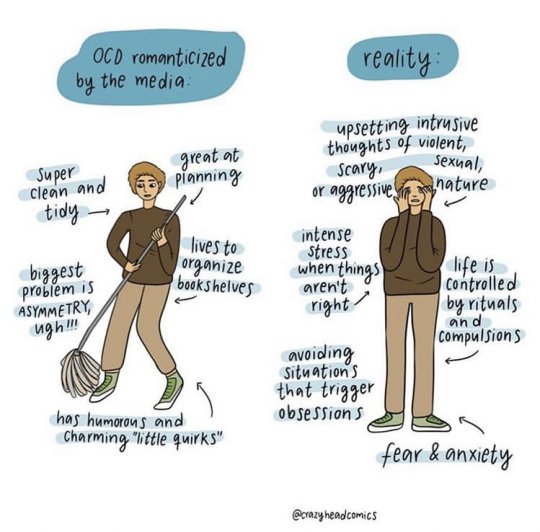
Credit goes to crazyheadcomics.
Look at how OCD got spoken from the media perspective. It is very much resemble to Biggs, dont u think? In reality, someone with OCD always feel stress about everything around them, and they will find it hard to complete their task.
OCD has two components - Obsessive and Compulsive
| 1. Obsessive. It is a repeating thoughts about something and often occur until it makes someone feel stress about it. Eg, u think that ur hand will get bacteria infection if u touch a chair, door, fridge or when holding someone's hand. This thought always appear in ur mind everytime u touch the door, chair, fridge or somebody's hand, but when u touch ur shoes, u never think about the bacteria (in certain cases, some patients become scare of everything they touch)
| 2. Compulsive. It is a repeating of the same actions to fulfill the 'obsession' in order to reduce the stress acted upon them. Usually the 'action' has a specific ways in which the patient believe he has to do it like this or that way or else he will fail. Eg, after touching the chair, he will immediately wash his hand 10x from left to right. He believes the hand washing wont be effective if he starts from right to left
Another sign of OCD is when someone re-checking the door lock few times. Its normal for us to re-check once/twice the door lock for confirmation, but for people with OCD, they will re-check the door lock for about 6-10 times and still not feel satisfied and later they stress out. And also the OCD people, they tend to get annoyed when something is not in particular order and they will immediately fix it eventhough they know they're wrong.
I met a funny woman at the hosp arranging our students' books according to its thickness, when I asked her why did she arranged our books like that,
She replied : "Doctor said I have CDO"
Me : "Sorry, CDO? Never heard of it"
She : "It is actually OCD but I feel so stress hearing that term so I put it in alphabetical order. CDO, much better"
We both had a good laugh. Her case was not serious though, but she was feeling miserable with her thoughts and decided to meet a psychiatrist. I would say she was still in early stage for someone with OCD, but may lead to severe if left untreated
It is really hard to satisfy and convince someone with OCD and they always feel stress about something they shouldnt care too much about. U can say OCD is a fastidious type, and they're actually more than that
If we want to relate this condition with Bigg's case., urmm. The only time where I can spot him being different than the other characters is when he's busy sweeping his front house and when he pat Cloud's head during the Sector 7 plate fall.
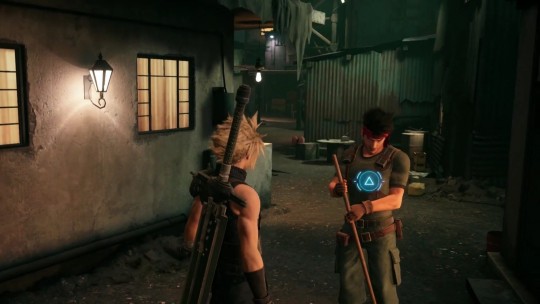
The cleaning stuff isnt exactly weird thing for a human to do. But it is something odd, I mean, he just finished his mission with Jessie and survived a jump from the plate, and yet he still have the energy to sweep dry leaves, AT NIGHT! He can wait till tomorrow though and should get himself a proper rest.
Wedge says Biggs has a habit of overthinking stuff
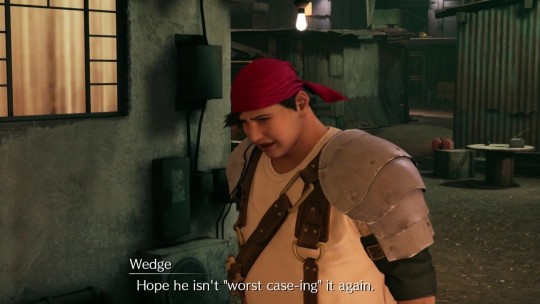
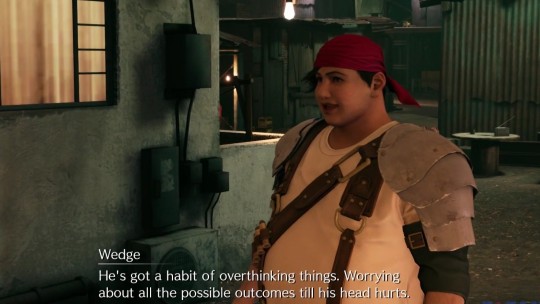
And there we see Biggs sweeping the dry leaves. It might be because he is trying to distract himself from doing his bad habit - overthinking. But urm , i think there'll be higher chance for someone to overthink when doing house chore like Biggs is doing. This is where lots of people say Biggs cleaning the house at night is bcause he has OCD or he's a perfectionist.
But I dont think thats the case. For real, he is completely normal. No sign of him acting weird in that scene. If he really does have OCD or he's a perfectionist, we'll see more of him arguing with Barret about unnecessary stuff. He cant become one of Avalanche's strongest member (not exactly strong, but hey, he's trustworthy). Also, if u notice, Biggs have one earring on his right ear. Someone with OCD will feel irritated by it bcause his ear doesnt look 'balance'. OCD people, even in mild case, they want everything about them to be balance and in good order.

After trying to understand Biggs way of thinking and style through his short screentime, I strongly believe this guy has no such thing as OCD or being a perfectionist. Biggs just cares tooooo much about his friends, he thinks 10 times ahead from the bigger picture in which it frightens him about the bad consequences that will occur to people he cherish.
He is the type that always have a back up plan in his mind. He thinks of 5 possible bad things and comes out with 10 solutions. That's the power of an overthinker like Biggs I'll tell ya

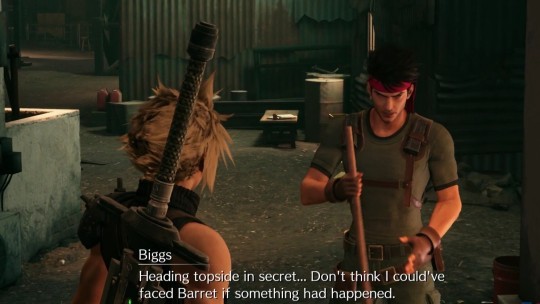
Biggs probably cleaning his front house area at night bcause the next early morning, he will need to leave his house for the bombing mission. Better take care of things the night before the big day. He can ditch the cleaning work but he wont do it, not bcause he's a perfectionist/OCD, but try to imagine this, if ur front house is full with dry leaves and rubbish, it will be unpleasant for the neighbours next to ur house to see. Living in the slum means higher chance for u to get sick if u dont take care of ur surrounding hygiene. Biggs is a kind man, and I believe he doesnt want to upset his neighbours
He probably has overthink this matter like "If i dont do this now, I probably dont have time for doing it tomorrow. Maybe I'll broke my leg from the mission and this trash will be left untouched, then there'll be high chance for the children around here to get sick. What if they get infectious disease bcause of this dry leaves? And then the parents will be worried and the Sector 7 Slum will be in chaos etc etc. Time for plan A. Let's clean this place"
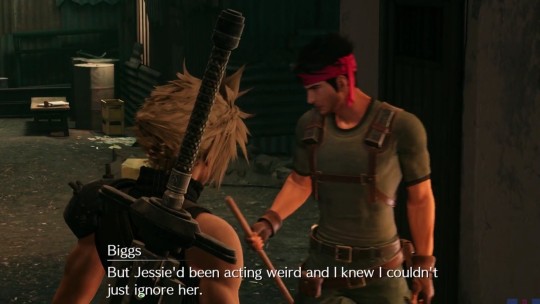
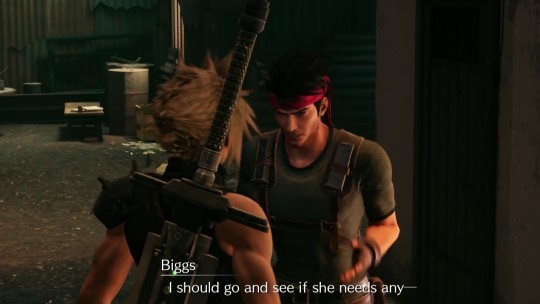
Besides, remember the post where I mentioned about Mental Health First Aid? Biggs, as the side character gives the best MFA to Cloud even without knowing what Cloud had gone through. Biggs is just toooo kind with his friends, he cares too much causing him to overthinks about his friends conditions. He can notice even the slightest change in his friend's behaviour and with his own instinct, he cheers for them

Aww man, how can u not love his personality? He's the sweetest side character ever (and kinda hot too).
Soo as the conclusion for my post here, Biggs does not have OCD. He's a side character with a big heart who cares tooooooo deeply about his friends that leads him to overthink too much.
However, if the devs say Biggs really has OCD then my statement about him will be invalid. I'm sure they have put everything in a very close detail look.
Btw, I personally think Biggs kind of portrays the other small side of Cloud, the overthinking part for their romantic partner. But Biggs express his worry through words while Cloud express it through his actions, eg - like how he always keep an eye on Tifa. He never speak it directly like "I'm worry about Tifa, I must help her", he just simply be with her either she needs a help or not. While Biggs clearly says "Jessie been acting weird, I should go if she needs any - help -"
Action speaks louder than words but sometimes our eyes failed to listen.
Alright, that's it. Thanks for being with me till the end.
#final fantasy 7#final fantasy 7 remake#cloud strife#final fantasy vii#biggs#biggs final fantasy#ffvii biggs#mygif#character analysis
58 notes
·
View notes
Text
Anon wrote: Hi MBTI-Notes, I have followed you for a few years and consider you to be incredibly knowledgable. I recently finished a program to become an MBTI profiler for an organization and summarily got involved with a number of other profilers with whom I discuss jungian theory with on a regular basis. Recently, we’ve been recording a profiling session here and there, with the client’s permission of course, and using the videos as discussion materials to sharpen our understanding and commingle ideas etc.
Recently, I had someone important in my life request to be typed. I was relieved, because for the life of me I cannot determine a best-fit type for this person that seems to settle 100%. He first typed as ENFP via one of the online tests, but he seems to use more Se than Ne. For example, last week we were discussing possibilities for his future because he’s feeling very stuck and he couldn’t stop getting up to handle other things in the midst of it.
Avoidance is a very common psychological defense mechanism - not very type specific.
It can never wait - any problem that comes along needs to be solved in the present, and everything else comes after. Half the time we’ll be in these discussions and he’ll have one distraction lead to another distraction and the next thing you know, he’s sitting at the piano tinkering while I’ve been waiting in the living room for his return. It’s not until he waltzes in completely oblivious that he even remembers we were talking. I attribute this to the sense of existing primarily in the present physically with Se.
You're saying that he's easily distracted because he's so present? That’s illogical. Being impatient, fidgety, or avoidant is often a sign of anxiety, among many other possibilities that you haven’t considered. Anxiety is not very indicative of type unless you can successfully link it to a function, which you haven't. To play devil’s advocate, it could be that he always has to be “doing” something to distract from what he is feeling, which is actually more indicative of Te than Se.
He is very VERY good at quickly figuring out (or instinctively knows) how to do hands-on things. We cohabitated for a few years and he did all the maintenance he didn’t trust the repair man with, and most the time did a fantastic job even though he had little to no training. He is very in tune with his surroundings...he prides himself on his good record with driving because he knows how to speed and can see cops a mile away,and he’s not wrong in his confidence there. He’ll see the slightest glint off a cop car decal from his headlights and reacts so immediately that I usually have to ask him why he did it. I won’t see the concealed cop car until we’re right next to it. It doesn’t even cross his mind to communicate why he does these things - which also feels very Se to me. I have very little to offer in terms of evidence for Ne.
Being able to learn quickly is a function of intelligence level, not type. Being observant is something anyone can choose to do if the stakes are high enough, stakes like wanting to avoid a hefty fine. This evidence is weak. You’re going to need more than that if you’re arguing the dominant function.
Further, I have witnessed strong Fi in him since I’ve known him. He is very principled, and often chooses to do the things he believes are right even if they don’t jive with the social standard. He takes a long time to process his own emotions and will outright say that he likes to help other people because he strongly believes that every single person deserves to be treated with kindness, even if they themselves are not necessarily a “good person”. He does a very good job of accepting people no matter where they are and will often excuse (or “understand”, as he puts it) their toxic behavior by pointing out that he also has negative traits and so do it. To me, that feels a very Fi statement. He is also into music as a form of self expression and has been playing his main instrument for the majority of his life.
You say that he's very principled in his beliefs yet he's willing to excuse people's bad behavior? There’s some contradiction there. Doesn't a principled person advocate strongly for their beliefs and try to fix what is bad? Any human being with good moral development likes to help people and believes that everyone should be treated with kindness. Fi does not have a monopoly on morality. Why are FJs often considered the kindest people around then? Moral development is a separate issue. People of all types enjoy playing music and expressing themselves through music. None of these things count as definitive proof of Fi.
I have waffled between ESFP and ISFP and had settled on ISFP because I see strong evidence of Fi-Ni looping on a regular basis and he has a huuuuge amount of insecurity around his inability to get things done to the same extent I can (ENTJ). When he is looping I have given him advice that would put him into an Se space and that has always seemed to be a magic elixir of sorts and immediately brightens him up.
Insecurity is not a defining characteristic of Fi-Ni loop. You’ll have to explain why you think that. Insecurity about competence is usually a sign of a lower T function, so, F. Insecurity specifically about being unable to plan/organize/implement effectively is usually a sign of low Te. You’ll have to explain "Se space". I'm not going to take your word that what you think is Se is actually Se, given what you said about it above.
However, the person that profiled him came up with ENFJ. Her argument for Fe dom was that he was constantly talking about how he chose teaching as a career path to “help underrepresented students” and how he always seems to be worried about how other people feel about his decisions. My response is that I thought Fi might be worried about this because outside disagreement with an internalized value would lead to painful cognitive dissonance. He also mentions consistently that his menthod of helping others is to call the emotion up in himself from prior experience and use that as a guide for what he’ll say. The profiler said “That just sounds like a roundabout way of saying he’s using Fe”. It seems to me that an Fe under would not have such an archive of emotions in their arsenal to call upon and are more immediate with it. Perhaps they would be more likely to say “I just know how others are feeling - I can sense it” I’m curious on your take of this.
You seem to be implying that Fe types don't have their own feelings and emotions? Being F, by definition, is enough to have a deep reservoir of knowledge about feelings and emotions. The fact that someone has to "call up an emotion" as opposed to having direct and immediate access to it seems more indicative of Fe distance than Fi proximity to feelings. However, being confronted with an emotion/experience that one is not familiar with would lead most people to try to call up a similar past experience in an effort to understand. This is called perspective taking and most people are capable of it. Empathetic people are naturals at perspective taking and human empathy is not type specific, though Fs tend to value it more as an important ability to have.
As for the rationale for Ni aux, she noted he mentioned a lot of discussion about the future and the implications of his actions. As someone who knows him a little better, he actually does this most often when he’s in “analysis paralysis” which I attribute to a Fi-Ni loop. I happen to think he’s just been looping for a long time and been too worried about the future.
Analysis paralysis is not a defining characteristic of Fi-Ni loop. You’ll have to explain why you think that. Nobody likes to think of their future as doomed, so anyone can be concerned about the future at some point in their life. You fail to ascertain, in detail, the true source, cause, and extent of the worry. If worrying about the future is a “chronic” condition, meaning that it is their primary psychological preoccupation, then it's more likely that Ni is high rather than low in the stack. If you’re going to claim that someone has been in loop/grip, very unnatural states, for years and years, then you’d better provide a proper explanation as to why their personality is so distorted. Too often, people just use loop and grip to twist the facts into fitting their hypothesis, without understanding what loop and grip actually are.
Hope I have given enough information - looking perhaps for your take on this and maybe some clarification for my own good in the case I have some wrong ideas about the more subtle differences between Fe and Fi or have misattributed a behavior or motivation to a specific cognitive function. Look forward to hearing back. Thanks!
I hope that I have not sounded too harsh. Since you are soliciting my opinion for the sake of clarification, my comments must take the form of critique. As far as I can tell, you have not gathered the right information to prove which functions he uses. It looks like your knowledge of the functions doesn't rise very far above the usual stereotypes, particularly with respect to Fe and Se, which contributes to the problem of picking out the wrong information. It seems that you do a lot of inferring/speculating about what his behaviors mean, as opposed to asking him directly for the meaning. It also seems that you like to stretch the details to fit the functions you want, as opposed to gathering a lot of facts and looking objectively at what function shapes they take. I suppose you could say that your type assessment process is a bit backwards. Very little of what you’ve described constitutes a truly enduring trend/pattern of personality. From the information you've provided, I am not able to confidently conclude anything other than F. If you put a gun to my head and forced me to choose between N or S, I’d go with N.
5 notes
·
View notes
Text
Nobody asked for this one, but I said I was gonna do it anyway. Barret and Cloud's friendship development.
Don't worry, I'm not gonna make a mile long post. I'm just gonna hit on the key moments, but I think these two deserve a bit of spotlight.
Ok, spoiler warning for ppl who haven’t played – do I still need to do this? Eh ok, (I tag FF7R spoilers as final fantasy 7 remake spoilers) and it’s gonna be reasonably long.
Also, this is one person’s interpretation of the scene, so if you disagree that’s cool and we’ll agree to disagree.
You’re also gonna have to excuse the janky quality on some of the screens, I’m grabbing them from Youtube and it’s frustrating af trying to get the exact moment I want.
Other analyses if anyone’s interested.
Shinra HQ vision scene (Cloti/plot analysis)
Chapter 3 (Cloti reblog)
Tifa character analysis
Aerith Resolution (plot analysis/theory – I should probably update this since I’ve had other ideas since then)
Train graveyard (not really an analysis, but I got some sweet screenshots of Cloti)
Clotiscrew tunnel analysis
Cloti reunion analysis
The Promise Analysis
Andrea’s approval (Cloti ask response)
Leslie analysis (not mine, but a good read)
Cloti action touching
Aerti friendship analysis
Cloti body language chapter 3
Cloti healthy disagreement
Cloti post heliboss battle (chapter 15)
Clerith playground scene
Cloti body language plate fall
Now, strap in and enjoy the ride.
I'm not recapping the whole game lol

Chapter 1: Barret isn't impressed one bit with Cloud. Watching back their early interactions and I keep noticing this sad look on Cloud's face when he's excluded. But then, I'm also like “Well you pushed them away first”. But I also wanna hug him.
Yeah, so Barret isn't impressed and he's outright hostile, calling Cloud names and antagonising him. He even shoots at Cloud and then raises his gun to take out a security bot. This man doesn't like Cloud and isn't afraid to show it.
You gotta remember, Barret is 6'5 and built like a brick shit house and has a machine gun on his arm. He's not someone to mess with. Taking that in, Cloud's dismissiveness is pretty impressive. I mean he's almost a foot shorter than Barret, after all, and his sword probably weighs more than him lol
Perhaps by the end of the chapter – after Cloud saves Jessie – Barret might have thawed a tiny bit towards him, but he's still mistrusting and doesn't like him.

Chapter 2 and there's not a lot of interaction between them. Barret does actually agree with Cloud when he says “what's done is done” in reference to the destruction. This shows Barret is pragmatic and not against Cloud himself, just his role. After that, Cloud's alone for the rest of the chapter until the above screen when he leaps into the cargo carriage of the train and Barret says, “You had me worried for a minute.”
He looks caught out when the others all look at him because he's been a total dick to Cloud throughout the mission, but this shows he cares about his team, even if he doesn't like everyone on it. Showing concern for his people is the trait of a leader and if the game were showcased differently we could assume that Barret is our leading man.
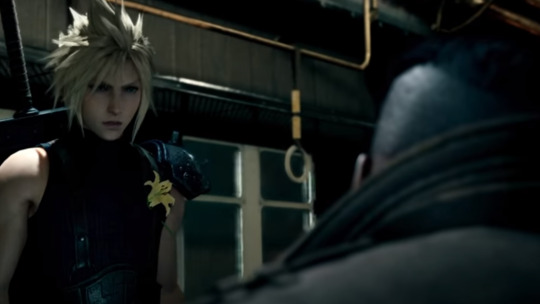
“The folks down here don't have the luxury of choice, you know.”
Still in chapter 2 and this is such a great moment between Cloud and Barret! There's no arguing, just Barret giving Cloud a different perspective that's not the badass merc “Idc” one he's showcasing. You can see once the conversation is over that Cloud grows introspective, so Barret's words clearly resonated with him. This looks like another marker on Cloud's chart of going from a douchebag to a decent human being. He thinks about how things are for other people. Later, Marle tells him to consider others feelings, too. To listen. I'm loving all these small moments that come together to build a clearer of picture of Cloud's development.
Barret actually removes his sunglasses – why is he wearing them at night? – to meet Cloud's eye. This is a gesture that shows his sincerity and belief in his words. He's not just blustering for the sake of it. He cares about the people and the planet.
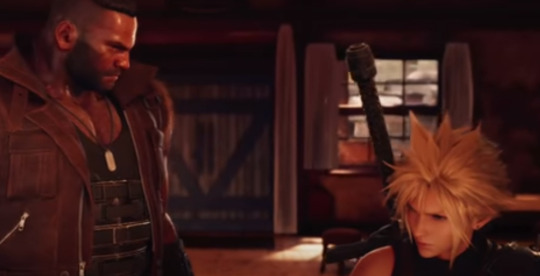
Chapter 3 and we don't see Barret until near the end. He's back to being snappy with Cloud – understandable since he's being a dick going on about money.
(aside: can I just squee at Cloud smiling at Tifa through this whole bit. He's such a dork)
And when we see Barret again he's very professional and courteous. There's no emotion in his tone and his words are very formal. He could be talking to anybody. His head dips as he's speaking, in an effort to lower himself more to Cloud's physical level. On an emotional one, he's making himself non-threatening. This isn’t a confrontation is what he’s putting out.
Cloud doesn't look happy at the dismissal and something we know about him is his desire for acceptance, so this probably hurts, although he acts otherwise.
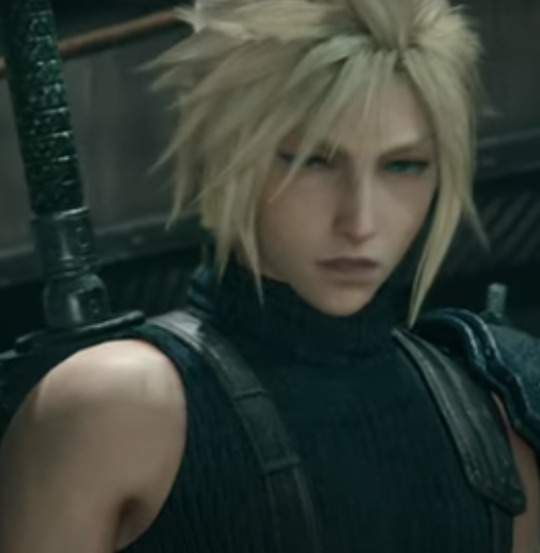
We're up to chapter 5 and this is a turning point between Cloud and Barret's budding friendship. Barret's in battle dialogue makes it clear he's trying to show off in front of Cloud, who's dismissive still. There's a lot of back and forth between them in the kind of guy banter that suggests they kind of respect each other, but they also just have to put up with each other.
The above screen is the second before Cloud says to Barret that he's better than that in response to his arguing with the Shinra manager. Barret seems surprised Cloud even tries with him, but what's more telling is this expression from Cloud shows he gave it some thought before speaking. He considered the right words to address Barret which shows he's thought about the kind of reaction Barret could have. He took in Barret’s words from chapter 2 and Marle’s from chapter 3. This is called character development!
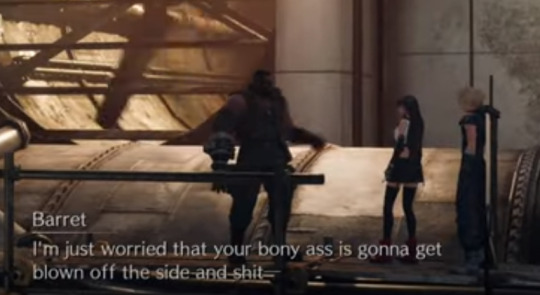
Chapter and Cloud throws some shade and Barret blusters lol
Tbf Barret's grown a lot less hostile since chapter 1. He's not as combative to Cloud, nor is he maliciously insulting him anymore. They've entered a stage of snarky banter, which we all know is one of the big steps on the road to friendship lol
Clearly Barret being able to see Cloud in action and rely on him in battle – not to mention Tifa's enduring good opinion – are starting to colour his own opinion.
(Tifa actually rears back when Barret waves his arm around in this bit lol)
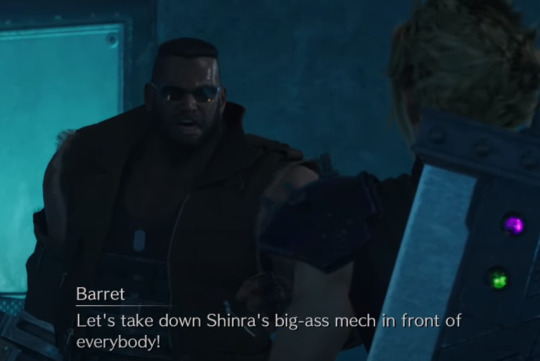
Barret looking to Cloud for back up here. I mean, they're all in the shit, but this is interesting that he's looking to Cloud for that reassurance they're gonna continue kicking ass. The fact Cloud agrees without even the tiniest disagreement is probably the first time they're genuinely on the same page through their own choice.
Let the friendship begin!
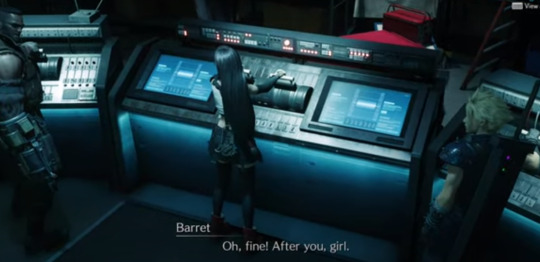
Now, I bet you're thinking I picked this one to showcase cloti, well you're wrong. This is an example of how Barret's mellowed towards Cloud from his chapter 1 hostility to now. Cloud disagrees with him and instead of getting pissed that his leader decision is overruled, he lets it go.This could be a moment of contention between them, but they’ve both grown enough over the game to get to the point that not everything between them is a fight.
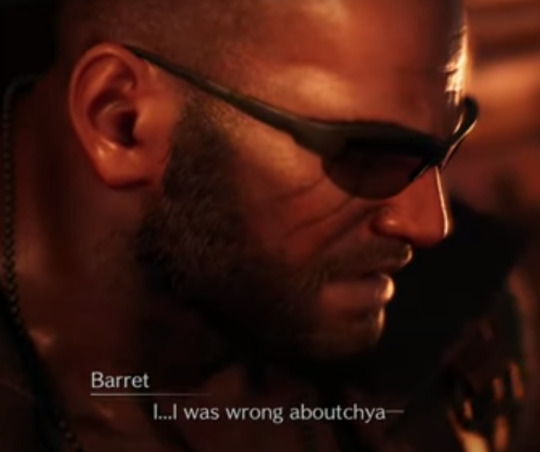
Now, maybe Barret's saying this because he thinks Cloud is about to die, but that seems selfish and like he's saying it to make himself feel better after being a douchebag, and for a selfless man like Barret I just don't buy it. He's genuinely regretful of his past actions and this is the point between the two of them that they can start again and actually become proper friends.
There's no time for much of a guy reunion between them when Barret does see Cloud again all the way over in chapter 12 -- that’s a long ass time apart for Barret to think about how he treated Cloud -- and we kind of brush past Barret's feelings because the plate collapse takes priority.
After that, Barret is much nicer to Cloud, trying to get his praise in battle and being a proper support to him. There's still that snarky banter between them, but the hostile edge has gone. We see a culmination of their friendship development during the stairs climbing sequence. Where before their banter had a hard edge and combative nature to it, this is very friendly and full of jokes and warmth. Barret has definitely softened towards Cloud and considers him a real friend. You can't fake that shit.
Conclusion
Yeah, I kinda cut this short and didn't do the latter half of the game, but that's because it's much more clear than this early development. Focusing on the small interactions between them that built a gradual friendship, it took a huge shock to get Barret to reassess his opinion of Cloud and him dropping from the reactor, going missing and then showing up to save the day covered it. It was like he got a reset and from that he dropped his prejudiced preconceived ideas about Cloud and opened up to him more. Because there’s such a huge gap between the time Barret sees Cloud again, it’s easy to miss the middle part of their friendship. The part where it goes from dislike to like. It’s easy to remember Barret hating Cloud and then see them being a team after chapter 12 because those moments stick in your mind more. It’s the transition that gets lost.
I love their development and how they become friends. It's not the kind of friendship that Barret shows with Red. Those two are bros the instant they met. Cloud and Barret's relationship is more complicated because of Cloud's role and identity. It takes Barret a long time to see past that persona, especially when he's only got evidence of that to go on – unlike Tifa. Once he does, he gives Cloud his full support and trust.
I, for one, can’t wait to see how they go forward in Barret’s arc.
#final fantasy 7 remake spoilers#final fantasy 7 remake analysis#Barret wallace#Cloud strife#friendship is the best ship
55 notes
·
View notes
Photo
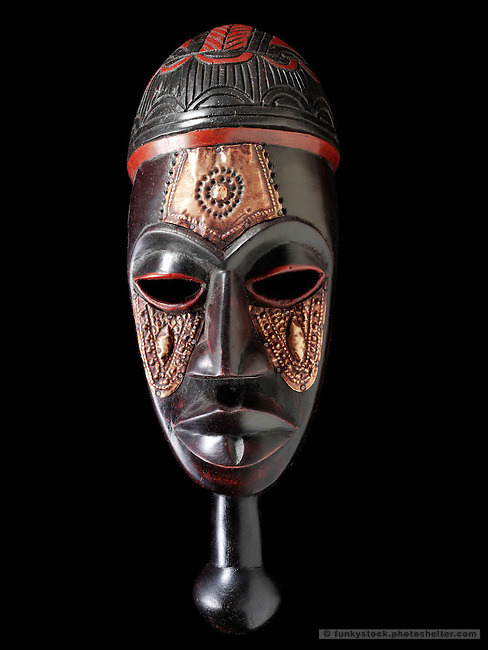
Belief in the Spirits of the Dead in Africa: A Philosophical Interpretation Crispinous Iteyo
Department of Philosophy and Religious Studies Maseno University [email protected] Thought and Practice: A Journal of the Philosophical Association of Kenya
(PAK) Premier Issue, New Series, Vol.1 No.1, June 2009, pp.147-159 [email protected] OR [email protected]
Abstract This paper offers a philosophical interpretation of belief in the spirits of the dead in Africa, with a view to identifying rational grounds for accepting or rejecting them. This endeavour is premised on the view that in this rapidly changing world, philosophy should inquire not only in to theoretical problems, but also into practical ones. Plato and Aristotle’s theories of the soul being some of the most carefully discussed philosophical theories on immortality or lack of it, will provide the background of deliberation in this paper.
Introduction In the world today, science and technology seem to permeate every aspect of human life. In-vitro fertilization, surrogate motherhood, genetic engineering, life support devices and genetically modified foods are among the myriad recent innovations. They attend to the material needs of human beings, thereby perhaps putting to doubt the value of generally theoretical disciplines such as philosophy. Nevertheless, the meeting of material needs does not necessarily satiate the range of human yearnings, because there are many issues of intense metaphysical and moral concern to humans that material things per se cannot address. Thus in spite of the scientific and technological advances, there is need to ask philosophical questions about challenges 152 Crispinous Iteyo such as fanaticism, discrimination, governance, the environment, cultural practices, and human destiny. In Africa, according to Mbiti (1969, 149), “there are many, and often complicated ceremonies connected with death, burials, funerals, inheritance, and the living dead, among others”, because belief in the spirits of the dead is common and widespread. This paper offers a philosophical interpretation of belief in the spirits of the dead in Africa, with a view to identifying rational grounds for accepting or rejecting them. This endeavour is premised on the view that in this rapidly changing world, philosophy should inquire not only in to theoretical problems, but also into practical ones. The paper is divided in to two sections. In the first, the term culture is explained and belief in the spirits of the dead among the Luba, Akan, Mende, Banyaranda and the Luo described, with special focus on Luo beliefs. The Luo are an ethnic group found around Lake Victoria in western Kenya, as well as in parts of Uganda and Tanzania. They belong to the larger linguistic stock called the Nilotes. In the second segment, philosophical interpretation and analysis of Luo beliefs about death is made. Plato and Aristotle’s theories of the soul, by far the most carefully worked out philosophical theories on immortality or lack of it, provide the background for the discussion. Conceptualising Culture Beliefs are key components of culture, largely influencing human behaviour. They are handed over from one generation to the other, sometimes with modifications. Culture influences people ostensibly because it provides them with an identity and a worldview through which they understand or interpret the cosmos. It is prudent therefore at this juncture to have a bird’s eye view of culture. Belief in the Spirits of the Dead in Africa 153 In the 1870’s according to A.T. Dalfovo in his article, “Culture: Meaning and Relation to Philosophy”, there was a shift in the understanding of culture from the personal to the social. For him, the new understanding emanated from Edward Taylor’s definition of culture in 1871 as the complex whole that includes among other things knowledge, beliefs, art, morals, law, and custom. This view gradually entrenched itself, so that it is now the prevailing understanding of culture. The social understanding of culture marked a shift from the theoretical to the empirical meaning, as a result of which humans were rescued from the notion of being cultured to the one of belonging to a culture. They were now seen as belonging to but not being, with the implication that no one would be without culture. This was in sharp contrast to the earlier theoretical interpretation, where some people would be cultured but others not. According to that earlier view, as something that could be possessed, culture meant the development, improvement and refinement of persons through education and training. This was in conformity with the meaning of the Latin word cultura (cultivation; attending to the land for the raising of crops). Applied to humans, the usage of culture tended to focus on the person, implying first of all an awareness of certain ideas, being conversant with certain mannerisms, possessing certain traits, and behaving accordingly. Thus according to the earlier theoretical perspective, culture was conceived normatively, stressing values rather than facts.
Consequently, enculturation implied the cultivation of ideas, principles and traits that would have automatically resulted in “proper” behavior. A cultured person was hence a knowledgeable person, whose learning was followed by appropriate conduct. On the other hand, an uncultured person was not learned, and hence not refined in manners. The shift from the person to society and from the theoretical to the empirical, meant that the emphasis moved from knowledge to behavior, that is, from theory to practice. A synthesis of the components of culture as empirical is summarized in a simple phrase – “a way of life”. Hence to Oruka (Oruka& Masolo, 1983, p57), culture is a people’s body of knowledge, beliefs, behavior, goals, social institutions, together with tools, techniques and material constructions. It is in this light that one can talk of European culture, African culture, or Chinese culture. In this sense one can say it is one’s culture to do or not to do certain things, for example, initiating boys into 154 Crispinous Iteyo adulthood by circumcising them. It is in this sense that belief in the spirits of the dead is examined herein. The “way of life” is not static, but is rather susceptible to influences from other “ways of life”. Internal or external forces can bring gradual or massive change. On this note we can ask what exactly African culture is. This would be asking about the identity of the African way of life, whether it is traditional or modern. This is because there are elements of modernity and traditionalism in the contemporary African “way of life”. This phenomenon has a historical explanation in colonization. As Thairu (1975) laments, colonialists introduced their culture that included religion, language, clothing, food, music, health care and a set of beliefs that Africans were conditioned to adopt. Okot p’Bitek captures this vividly when he states: … contrary to the African idea that everybody must marry in the prime of their youth, have a family (and for a man, the more wives and children he has the better), young intelligent, beautiful and handsome Africans were lured to think that wifelessness, husbandlesness, childlessness, homelessness, were a virtue. (1986, p15).
During the colonial era, terms such as “cultured” and “uncultured” - indicative of the theoretical and personal meaning of culture - were in vogue, perhaps as a technique of luring Africans to abandon their culture. A cultured African was that one who shed his traditional culture and embraced the Western one, while an uncultured African was that one who stuck to his/her traditional way of life. The ‘uncultured African’ was seen as “backward”. As much as colonialism disrupted African traditional culture and introduced what may be called modernity, the divide in terms of who or what is traditional and who or what is modern is not succinct, because ‘traditional culture’ was not obliterated. Some aspects of European culture have become part of culture in Africa, having been fully embraced. In other instances, both traditional and modern remedies may be sought to solve problems. Placide Tempels captured this fact thus: … among our Bantu we see the evolues , the ‘civilized’, even the Christians, return to their former ways of behavior whenever they are overtaken by moral lassitude, danger or suffering. They do so because their ancestors left them their practical solution of the great problem of humanity, the problem of life and death, of salvation or destruction (Tempels 1959, 18). Belief in the Spirits of the Dead in Africa 155 Spirits of the Dead in African Cultures Belief in the spirits of the dead in African cultures is widespread, as evidenced in the examples of the five African communities below. In the Luba thought as Tempels (1959) writes, there is belief that the dead fathers of the community still exist but in spirit form. After God in terms of force, he writes, come the first fathers, founders of the different clans. The ancestors constitute the most important chain, binding humans to God. They occupy an exalted rank, in that they are not regarded as the ordinary dead. They are, in Tempels’ view, spiritualized beings, being higher on the ontological hierarchy, participating to a certain degree in the divine force. After the first fathers were the dead of the tribe, following their order of primogeniture. They according to Tempels formed a chain through which the forces of the elders exercised their vitalizing influence on the living generations. The Akan people, according to Gyekye (1987) similarly have a conception of the spirits of the dead, manifested in their religious language, attitude, and practices.
For example, the language of the religious rite of libation runs as follows: Supreme God, who is alone great, upon whom Men lean and do not fail, receive this wine and drink. Earth goddess, whose day of worship is Thursday, receive this wine and drink. Spirits of our ancestors receive this wine and drink (Gyekye, 1987, 85) Writing on the Mende, Little (1976) observes that the ontology is that of spirits. At the apex of the hierarchy there is Ngewo, the super spirit - Supreme Being. Below the Supreme Being are spiritual beings that fall broadly into two categories, ancestral, and non-ancestral spirits. The ancestral spirits are the spirits of former living members of the community - both former members of the various cults, as well as individual families. The non-ancestral spirits comprise certain widely known spirits or genii (Dyinyinga), associated quite often with natural phenomena such as rivers, forests and rocks, but not confined to any one locality. In presenting the cosmology of the Rwandese, Maquet (1976) says that the Banyarwanda view reality in two perspectives - from that of the material and that of the non-material world. The non-material world is composed of two categories, namely, that of God – Imana, and (2) the spirit of the dead Bazimu. The Bazimu 156 Crispinous Iteyo continue the individuality of living persons, and have the same names. Though nonmaterial, they are localized by their activity. They are viewed as not drinking, eating, or mating, but their existence in other respects is similar to that in the world of the living. The Bazimu sometimes come back to the world, returning to the places where they used to live. These spirits may stay permanently in the hut where their descendants live, or in the small huts made for them in the enclosure around the homes. Whatever their temperament was when they were in this world, it is believed, the Bazimu are bad. In order not to irritate them, various observances and interdictions must be complied with. Hence, there is the ‘cult’ of the Bazimu, which among other things, aims at appeasing the spirits. In Luo culture, belief in the spirits of the dead provides a basis for most of the practices that take place from the time one dies to the end of the mourning period. According to Oruka, spirits of the dead are to be feared since, if one does not comply with the customs, then he/she is haunted by them. Asked in a court proceeding why a burial ceremony has to be performed at even a drowned person’s home, he answered that if the ceremonies were not done, “the spirits of the dead would haunt the people, claiming they were ignored” (Oruka 1991, 71). The belief is that a human being is made up of visible (the body) and invisible parts (tipo). The union of the two parts forms human life. At death the body perishes, but tipo becomes the spirit. The spirit retains the individual identity, but becomes more intelligent and powerful than in the previous life. The spirit becomes jachien (demon) if and when the circumstances surrounding ones death were either not honorable or questionable (for example if it was through suicide). Spirits, in their spiritual form though, according to OchollaAyayo, (1989), are not separated from their clan. The above Luo beliefs lead to certain practices during and after the mourning period. For example, the dead have to be accorded due respect with the consequence that, among other things, dead bodies must be disposed of in a dignified and respectful manner, with all ceremonies that befit it; no farming and other economic activities are to take place in the vicinity of the bereaved home, because the dead is mourned by the community, and not simply by the family; funeral attendants must be fed; bodies must be buried in coffins and in their homes and if possible, graves should be plastered; funeral fire, magenga, must be lit and be on for seven days after the burial of a man, Belief in the Spirits of the Dead in Africa 157 and for three days for a woman; several ceremonies after burial, for example, nindo e liel, tero buru, and tero tipo take place in order to appease the spirits. Although the procedure observed and the amount of money spent in burials in the Luo culture may show variations according to sex, age and social status as well as certain peculiarities, Ayiemba (1986) observes that if the dead was not a celebrity, a certain minimum number of animals is required for slaughter. If the dead man was married and had grown up children, for example, there has to be a bull for the elders, a bull for sons-in-law, a bull or goat for wife or wives’ relatives, and a he-goat for maternal relatives. If his social, political or economic status was high, more animals would be needed. Interpretation and Analysis.
In all the cultures mentioned above, there is the conception of the world of spirits. The categories of spiritual beings in this world differ from one thought system to the other. Nevertheless, it is apparent that there is the category of God or the Supreme Being, and then the category of “other spirits”, that is, ancestral spirits and/or “the spirits of the dead”. Spirits are believed to have more power than humans, but have less power than God. Some may be seen as having places of abode, while others seem to wander in the wilderness. Because they have more power than humans, they are capable of diminishing or increasing human power. To avoid the diminishing and to enhance the increment of power, humans placate them through prayer or other practices such as naming the newborn after departed relatives, or burying the dead with pomp and funfair. In short, spiritual entities are taken to be so real as not to be left out of a people’s ontological conception. This implies belief in life after death. When one dies, he or she becomes a spirit, and moves into the world of spirits where spiritual powers are acquired, and thereby able to positively or negatively affect the living. This is what calls for a philosophical analysis. Death and the common views and beliefs that surround it pose philosophical problems, for example, whether or not there is life after death and if so, what its nature is. These questions can best be discussed against the background of Plato and 158 Crispinous Iteyo Aristotle’s philosophical theories on the soul, not on the assumption that they are true, but as a framework for a systematic analysis of the phenomenon. Before Plato’s theory, Pythagoras, a mystical thinker, had taught that man, who was intermediate between God and the brutes, had a soul which after death migrated into other bodies. Compared with the gods, he held, man is very low and subject to error and death, but compared with the animals he is high up, capable of rising to greater heights. However, man could only rise to greater heights by purifying the soul. Pythagoras formed the orphic brotherhood to ‘save souls’ by teaching its membership steps to purify their souls. Plato’s theory of the soul is found in Phaedo, where he holds “that the soul is not only immortal, but also that it contemplates truths after its separation from the body at the time of death”. This assertion has two implications, namely, (1) that the soul does not perish at the time one dies, and (2) that the soul is characterized by cognitive features. This is explained by a number of reasons. First, the soul is immortal because it is exempted from dissolution and destruction, being among things that are not perceptible, but rather intelligible. Second, the soul is immortal because it is cyclical, in the sense that being alive is preceded by being dead, with the implication that ones ‘death involves the continued existence of the soul in question’, which goes on to animate another body. Third, ‘the soul is immortal because it has life essentially’, which implies that at no time can it cease to have life. In view of the foregoing, it can be inferred that for Plato, the human being is an amalgam of perishable body and immortal soul, meaning that there can be life after death. Death only separates the soul from the body. As the body perishes, the soul continues with life. Regarding the nature of the soul’s existence after ones death, Plato held that the soul of a person who was pure, one liberated from the things of the body, departs to the invisible world, to live in bliss in the company of the gods, but that of an impure man, the one who loved things of the body, becomes a ghost or enters into the body of an animal, for example a wolf or a hawk. Aristotle’s theory of the soul is embodied in his account of form and matter, which holds that every material being is composed of prime matter and substantial form as Belief in the Spirits of the Dead in Africa 159 its ultimate constituent principles. Substantial form is constant and unchanging, but prime matter comes and goes with every successive change to which the body is subjected. Matter is anything which has extension, that is, it occupies space. In living things, the substantial form is the soul, which is the source of the body’s functions and behavior. Plant soul he called “vegetative soul”, animal soul “sensitive soul”, and that of man he called “rational soul”. This is in a way equating life with soul, for to Aristotle, they both meant breath, which he saw as that which greatly differentiates living from non- living things. In summary, for Aristotle, ‘soul is a particular kind of nature, a principle that accounts for change and rest’ in living things. For Aristotle, living things function in their specific manner by virtue or potency of their souls. Thus Aristotle agree with Plato that the soul and not the body is the animating principle of a living thing. He however differed with Plato regarding the destiny of the soul. The implication of Aristotle’s theory is that a person’s soul has no life after his death. Death would ipso facto mean that the soul has ceased to be. These two theories have relevance to the belief in the spirits of the dead in a number of ways.
First, there is the categorization of things in to form and matter. The categorization does not only provide for incorporeal substances such as the soul, but also opens up the possibility of an afterlife because if the soul is imperishable, then it outlives the body. But the provision and possibility is wrought with problems, for example the need for a justification of the belief that the soul is, and that it survives bodily death. Although Plato and Aristotle attempt to address these problems in their theories, the questions still remain. For example, to Plato the soul is a simple and immaterial entity containing no parts, and that which activates the body. It is the principle of motion as it is intrinsically active. Aristotle concurred with this by stating that it is the soul that differentiates living from non-living things - that the soul is the life of the body without which the body loses life and therefore activity because the soul is essentially life. However, these postulations do not prove that souls exist. The soul is only seen as the explanation of the activity in living things, and this is simply speculation. With the two conceptions above having failed to establish that souls exist, another approach is needed, perhaps the rationalistic one. From the rationalistic viewpoint one has to start like Plato and Aristotle with the premise that the soul is that which makes 160 Crispinous Iteyo a thing active, and that two kinds of things are observed in nature, namely, living and non-living ones. What living things have and non-living things lack is activity or life. When this activity or life vanishes, the body becomes a non-living thing. One then can move on to argue that if the thing that gives activity or life to the body is what is called the soul, then “soul” exists. This is simply arguing thus: living things are differentiated from non-living things because they contain activity; living things contain one thing that non-living things lack; if “the thing” in living things is what is called ‘soul’ then the soul exists; meaning that the soul must be the explanation of activity in living things. Nevertheless, the rationalistic approach assumes that things were created the way they are and hence living and non-living things will remain so. However, if taken in the context of evolution, one may argue that living things are not special, but are only a step ahead in this natural process, so that ‘non-living’ things today may be ‘living’ tomorrow. What this means is that “living” is simply a capacity rather than a substance (soul) that can depart from the body at death. Hence there is no entity called “soul”, but merely the capacity or activity associated with a living body - perhaps agreeing with Aristotle. If it is granted that there are souls, the question of their destiny arises. An answer to the question of what happens to the soul when one dies is derivable from the conceptions of the relationship between the body and the soul. There are notably two different conceptions regarding the relationship of these two. The first one is that which is advocated by Aristotle, that the soul as the form of the body is bound up with the body, its work being to move the body and perceive sensible objects. It makes the body an organic whole, having purpose as a unit. To this conception, it is not possible to separate the two, as they are related as matter and form. A view resulting from this is that the soul ceases to be at death, being incapable of having further existence beyond bodily death. The implication of this is that the soul is mortal. The second conception is that which supposes that the soul can depart from the body. This conception considers a living thing as composed of two primary principles - body and soul.
The main proponents of this view as already observed were Pythagoras and Plato. Pythagoras and his orphic brotherhood taught the transmigration of the Belief in the Spirits of the Dead in Africa 161 soul. After a person’s death, they believed, the soul picked up another body, transforming into other kinds of living things. This means that whatever comes into existence is thereby born again in the cycles of life, nothing being absolutely new. Therefore just as a person casts off worn-off garments and puts on others that are new, the embodied soul casts off dying bodies and takes on others that are new. And to Plato’s theory, the soul is some kind of a “prisoner” trapped in a body, and that the purpose of philosophy is to free the soul from its entrapment in the body, that is, to enable it to attain its highest perfection (Lisska 1977, 102). This conception, therefore, leads to the view that the soul can be separated from the body. To George Galloway, some cultures highly subscribed to this view and even held that the soul “could detach itself from the body to roam at large in the world, and hence one would wake up where he lay down but in the interval his/her soul would have been abroad on strange adventures” (1960, p93). This conception lays ground for the separation of the soul from the body at death, and also the belief in the immortality of the soul, and the possibility of it existing as a spirit as its destiny would most probably be destined to the ontological mode of spirits. On the empirical front, there are reports that not only suggest that there are “souls”, but also that there is life after death. For example, people who had been declared dead but who had been resuscitated, have reported their experiences (Hick 1993, 129). The implication of this is that if there are souls, they are capable of independent existence from the body. Further, in Hindu and Buddhist cultures, it seems self-evident that people have lived many times before and must live many times again in this world (Hick 1993, 133). Evidence for this is that some people claim to have certain memories of people and events experienced in a previous life, and that some impartial investigators end up confirming such occurrences. Such claims may reinforce the view that indeed there are souls. However, one major weakness of the reports from those resuscitated and re-incarnated is that they present two different claims about the same thing. Is it not contradictory that the same thing (soul) should be re-incarnating in one culture and in the other moving straight to the “world of spirits”? Differently put, does one’s soul transmigrate because one is born in say Hindu culture, and that the other goes to heaven/hell because one is born say in a Christian culture? One may come to the 162 Crispinous Iteyo conclusion that either only one of these is true, or that both are false. The possibility of both of them being false would inevitably mean that there are no souls or that if they are there, they perish with the body, and this might imply that there are no spirits of the dead.
Obviously, believers in the spirits of the dead would subscribe to the second conception of the destiny of the soul, which is that the soul is preordained to proceed to the ontological mode of spirits - that it disembarks from a dying body and moves on. However, it can be argued that even if the second conception is true, that there are souls that transmigrate or become spirits or go to heaven or hell at the death of a person, there would still be need for a strong argument in support of the view that the soul or the spirit still gets interested in the dead body to the extent that the manner in which the dead body is disposed, where it is disposed, how long it takes to be disposed, and how the mourners are treated, may irritate or please it. One may be perfectly correct to assert that if souls exist and become spirits at one’s death they may not be bothered with how the body is treated, because the relationship between soul and body will have come to an end.
References Ayiemba, E.O. 1986. “Sagacity” in Were,G.S., B.E. Kipkorir, and E.O. Ayiemba Eds. South Nyanza District Socio-Cultural profile. Nairobi: Institute of African Studies, University of Nairobi, pp.17-27. Bostock, D. 1986. Plato's Phaedo. Oxford: Clarendon Press. Byrne, E.F. 1969. Human Beings and Being Human. New York: Meredith Corporation. Dalfovo, A.T. “Culture: Meaning and Relation to Philosophy”. Nyasani, J.M. ed. Philosophical focus on Culture and Traditional Thought Systems in Development. Nairobi: Evans Brothers (Kenya) Limited. Ferguson, J. 1970. Socrates: A Source Book. London: Macmillan and Co. Ltd. Galloway, G. 1960. The Philosophy of Religion. Edinburgh: T & T. Clark. Gyekye, K., 1987, An Essay on African Philosophical Thought: The Akan conceptual scheme. Cambridge: Cambridge University Press. Hick, J. 1993. Philosophy of Religion, 4th Ed. New Delhi: Prentice Hall of India, Ltd. Jowett, Benjamin Trans. 1953. The Dialogues of Plato. Oxford: Clarendon Press. Lisska, J.A. 1977. Philosophy Matters. Columbia: Charles E. Merril Publishing Company. Belief in the Spirits of the Dead in Africa 163 Little, K., 1976. “The Mende in Sierra Leone”. Forde, Daryll ed. African Worlds: Studies in the Cosmological Ideas and Social Values of African Peoples. Oxford: Oxford University Press. Longman Concise English Dictionary, 1985, Longman Group U.K. Limited Burnt Mill, Harlow. Maquet, J.J., 1976. “The Kingdom of Rwanda”. in Forde, Daryll ed. 1976. Mbiti, J.S. 1969. African Religions and Philosophy. Nairobi: Heinemann Kenya Ltd. Mourelatos, A.P.D. ed. 1993. The Pre-Socratics. Princeton: Princeton University Press. Nussbaum, M.C. & A.O. Rorty eds. 1992. Essays on Aristotle's De Anima. Oxford: Clarendon Press. Ocholla-ayayo, A.B.C. 1989. “Death and burial: An Anthropological Perspective”. Ojwang,J.B. and Mugambi, J.N.K. eds. The S.M. Otieno case: Death and Burial in Modern Kenya. Nairobi: Nairobi University Press, pp.30-51. O’connor, D.J. ed. 1985. A Critical History of Western Philosophy. New York: The Free Press. p’Bitek, Okot. 1986. Artist the Ruler: Essays on Art, Culture and Values. Nairobi: East African Educational Publishers Ltd. Oruka, H.O. ed. 1991. Sage Philosophy: Indigenous Thinkers and Modern Debate on African Philosophy. Nairobi: Acts Press. Oruka, H.O. & Masolo, D.A. eds. 1983. Philosophy and Cultures. Nairobi: Bookwise Ltd. Rheeders, K., 1998. Some Traditional African Beliefs: A Beginners Guide. Abington: Hodder & Stoghton. Russell, B., 1961. A History of Western Philosophy. London: George Allen & Unwin Ltd. Stanford Encyclopedia of Philosophy.2009. “Ancient Theories of Soul”. http://plato.stanford.edu/entries/ancient-soul/ Stumpf, E.S. 1993. Elements of Philosophy: An Introduction, 3rd Ed. New York: McGraw-Hill, Inc. Tempels, P. 1969. Bantu Philosophy. King, Colin Trans. Paris: Presence Africaine. Thairu, K., 1975. The African Civilization. Nairobi: Kenya Literature Bureau.
146 notes
·
View notes
Text
Annie Tardits, "The Trainings of the Psychoanalyst," 121-124
Did Lacan take the risk of encouraging the wild training that Jones had so dreaded? As soon as a training is deregulated and essentially referred to “pure psychoanalysis”, the necessity of the institution for a training is put into question. But the notion of school can be differentiated from the notion of institution. That is the sense of Ey’s answer to Lacan’s request that he join the Freudian School of Paris: “A school is formed when a master teaches freely to free students. A school is not an institution; it is not based on its officiality but on the prestige of its master” (Ey’s letter to Lacan, quoted in Roudinesco, 1990, pp. 429–430). While praising the “great intellectual courage” and “immense effort” of Lacan, he discouraged him from weighing himself down with an institution. He regretted that Lacan did not break with “the adventure of lay analysis” and did not remain for the medical analysts the master that he was and that they needed. Even if he did not grasp the full measure of Lacan’s attempt to renounce the position of master of truth by incorporating the problematic of the desire of the analyst into the institution, Ey saw very well that the stake of this institution was the setting up of analysis as a lay practice.
One might think that the institution serves to announce one’s setting up in the profession, something which remains clandestine in the IPA unless authorized by one’s Society. One might think that it serves to retroactively confer recognition on a prior training and to constitute a clientele through plugging into a network of power and influence in which supervision can take on a decisive function for each of the participants. One might think that it offers to analysts supposedly already trained the occasion to train further, following their theoretical options, that is, to the theorizing that conforms to the small part of subjectivity proper to each. Last, one could attribute to it the task of sustaining an orthè doxa against which everyone can test the phantasmatic elucubrations with which they would rationalize the enigma of their desire and the way it is put to work in their practice. The question of doctrine and its transmission was central to Freud’s institutional initiative prior to any notion of training and qualification. In creating an institution that was solid enough to shelter the doctrinal kernel, he left himself the liberty to continue inventing analysis. But he also took the risk that the orthodox censors he had instituted would ignore the revisions he might introduce. Lacan and some others with him thought that the foundation of the School found its guarantee in a teaching devoted to redeveloping analytic doctrine by getting as close as possible to its object. It was a way of suggesting that a training appropriate to the particularity of lay analysis might require a very different relation to doctrine and to the “praxis of theory” than the one induced by the institution of an orthodoxy or the reference to a master (of truth or knowledge).
A wild training was no more agreeable to Lacan than to Freud; but “regular transmission”, governed by the second fundamental rule, seemed to him more in keeping with analytic rigour than a regulated transmission. Because of the discipline of work and thought it presupposes, his “liberal” reference of 1953 actually went against free enterprise, something that derives in the final analysis from the ego. It is doubtless not surprising that the principle he formulated in 1967––“an analyst only authorises himself from himself”––lent itself to ambiguity as much as his reference to the liberal arts did. This principle, which demands rigour from both the subject and the institution, has been used to authorize the self-auth- orization of the liberal “setting up practice”. The misunderstanding is both radical and simple: understood as a “oneself authorizing oneself”, the principle would read in the first person: “I myself authorize myself “ (“we authorize ourselves”). Recognition would then be equivalent to “you yourself authorize yourself”. But Lacan’s principle, which concerns the absent part of the subject, rigorously contradicts these formulations and can only be said in the third person. It involves a different requirement from the analytic community and the institution, which Lacan would formu- late in 1974, specifying that the analyst authorizes himself from himself and from “some others”. Not from some ones. The formu- lation of this principle, in 1967, responded in a certain sense to the error of Nacht, which had led to the split in 1953. It is important to note that Lacan only articulated it at the moment that he produced the “apparatus” designed to treat, by renewing it, the question left latent during the foundation of the School—the question of recog- nition and qualification.
Despite the Hegelian idea which, in the 1950s, allowed the substitution of the “training oneself” of the Bildung of the classical age, for the “one trains” of the artisanal model, and despite the radical critique of the organization of the IPA, Lacan did not simply take “a negative path” when it came to the institution. The teach- ing and the study days always took account of the scientific, medical, and psychiatric context. With the diffusion of the work in the Lettres de l’École, several journals participated in the mechanism of training, distributed over the three sections in the manner of a “musical training”: L’Inconscient, Scilicet, L’Ordinaire du psychana- lyste, Ornicar?. But Lacan was familiar with what happens to spontaneous institutions, like the one Freud had allowed to develop, first failing to theorize itself, second for lack of a theory (and hence an imaginary) capable of sustaining another mode of organizing itself. The School training is, therefore, also a way of responding to the spontaneous institution, almost in the sense of a “military training” (Lacan spoke of an “operational base”) obeying a strategy. Lacan, in effect, had attempted to forge a social bond between analysts and analytic discourse. He saw it as a condition for letting analytic training remain within the field of Freud’s discovery, as other discourses barred access to this (Lacan, 1973, p. 10).
The spontaneous institution, however powerfully organized Freud analysed in Massenpsychologie und Ichanalyse (Freud, 1921c, pp. 67–145). It allows disparate elements to hold together, united by one common attribute: an identity––a professional identity, but also a reference to a founder can take on this function. The illusory character of this link in no way invalidates its efficacy, this latter deriving in large part from the “confusion in a single point, of the signifier of the ideal in which the subject locates himself with the ‘a’, that is, the localization in that point of jouissance” (Lacan, 1991, p. 257). It is a way of dealing with number. The “extra” trait (a leader, incarnated or not, a doctrine, the “name of one”, the voice of a dead person) that sustains the identification of each with the collective allows one to keep adding new elements to the others indefinitely. There is no numerical limit to this expansion, which contains an indefinite number of entities and which aims to base its power on numbers. The spontaneous institution is coherent with the dominant social bond in which the subject is instituted by a master signifier, which divides him certainly, but in which this division is phantasmatically denied, giving the subject hope of being completed by the object of his desire and thus rejoin the “self’” he was separated from. Transference links do not contradict this movement as they proceed by identification and the attribution of an agalmatic object to the analyst. The history of analytic institutions repeatedly illustrates the reciprocal collusion of spontaneous institutions and transference links, showing how the incidence of these links on the group can, inversely, lead treatments and theory into an impasse, bar access to Freud’s discovery, and prevent the knowledge of structure at work in the analytic act from being constructed.
2 notes
·
View notes
Photo

April 11, Leeds - Countering Antisemitism: Workshop & Training
Join Momentum Leeds for a workshop on understanding, spotting and countering anti-semitism led by Dr Uri Gordon from the University of Durham.
Uri is a practising Jew, an Israeli academic, a long-term campaigner for the rights of Palestinians, and an active participant in anti-capitalist movements in the UK over the last 15 years.
Anti-semitism is a particularly insidious form of racism, that has been prevalent in Europe for more than 2000 years. It is unique because it doesn’t only appear in ways that portray the target as inferior, but often in ways that see them as superior to the majority, and in control of society.
Conspiracy theories about Jewish banking families such as the Rothschilds, and groups of ruling elites (like the 'illuminati’ - or even ‘lizard people’) deciding the direction of society according to their own agenda can often appear to be criticisms of capitalism and attract people wanting a better deal for working class people. However, these ideas are rooted in centuries of anti-semitic thought, tropes and conspiracy theories about Jews, and are pushed by the far-right.
Through learning about anti-semitism, we can begin to effectively combat it wherever it appears, and through political education, we can build a proper analysis of capitalism and avoid the pitfalls of lazy, undeveloped political analyses, which can fall into racist stereotypes.
99 notes
·
View notes